#final fantasy 7 remake analysis
Text
FF7R Mini Theory: Hollow and the Sefirot
So I've been noticing something regarding Hollow and the Kabbalah (it's way too complicated to explain here, but it's basically just Jewish mystism). Anyways, in the Kabbalah, there are these divine attributes called the sefirot from which God would reveal himself. It's also very important because this is where Sephiroth got his name from.

There's also the polar opposite of the sefirot, the qliphoth. The qlipoth that protects the sefirot much like how a peel protects a fruit. The qlipoth are also known to be called "empty shells/husks"
It's like there... hollow inside. Just like Cloud Strife himself
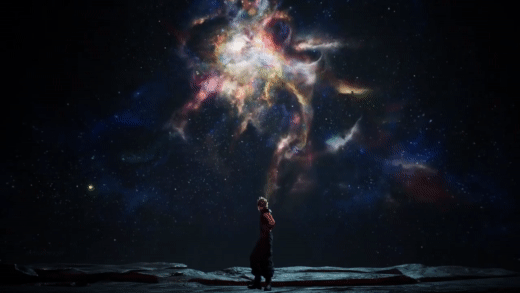
So without these sefirot (divine attributes) that manifest in the physical and spiritual realms, the universe will basically descend into chaos, which is the last thing we want. Cloud and Sephiroth during the edge of creation scene represent the universes of creation (Cloud) and death (Sephiroth), yin and yang,
The Qliphoth and the holy Sefirot

Well...without the sefirot, what will the qlipoth's purpose be? They are now empty, hollow shells, kinda like how Cloud's mind is shattered and how he wants to be whole again, yet he needs to regain his true self in order to do so. The sefirot makes the qlipoth complete, just like how Cloud becomes complete with Sephiroth.
#autistic rambling#ff7#ff7r#final fantasy 7#ff7 rebirth#ff7 remake#cloud strife#sephiroth#sefikura#my theories#my analysis
98 notes
·
View notes
Note
Why do you think some people think just because Hojo is unattractive to them, that somehow makes him not Sephiroth's father? Do they not consider that maybe Hojo looked like Sephiroth when he was young or maybe he got his looks from Lucrecia?

*cracks knuckles* You got me stepping into hot water, now. Disclaimer: Most of this is just my opinion.
I think this phenomenon also comes from the camp of people who just want Vincent to be Sephiroth's father. While people can hold differing opinions, the cold, hard truth is that Sephiroth is, without a doubt, Hojo's son. Not only by their physical similarities, particularly in 7R, but also by the several overlapping personality traits that they share. The apple doesn't fall far from the tree. If I recall correctly, they even have a similar laugh!
These strong similarities are also why Hojo projects on Sephiroth. His son is the living embodiment of his dream of transcending humanity through his scientific brilliance. He is also undoubtedly an abusive parent who displayed an unhealthy obsession with his child. He repeatedly endangered him, objectified him, and followed him obsessively. I mean, the Silver Elite existed before Sephiroth was even a teenager!
As for their personality traits, it's important to know Sephiroth and Hojo share a ruthless drive towards their goals. They do not care about morals and ethics. They will get what they want no matter what. Hojo also shares Sephiroth's intense narcissism and disregard for most humans. Yes, even pre-Nibelheim Sephiroth had shades of this as well. While Sephiroth's narcissistic tendencies can be traced back to his position as Shinra's prized weapon, it becomes more reminiscent of Hojo's narcissism after his descent into evil. I believe it's possible that Sephiroth suffers from a form of Acquired Situational Narcissism. Give that link a click to learn more about it.
Their physical similarity is debatable in older games, but in 7R? They share a much stronger resemblance. It's clear they have many similarities in their facial features, including their nose, lips, facial shape, hairlines, and so on. Of course, Sephiroth still has traits from his mother as well, some in personality and appearance. But boy, do some underestimate the similarities between father and son.
I also think a good deal of this phenomenon is due to Draco in Leather's Pants. Sephiroth is a tragic villain, but it's easy to forget that "villain" part as well. It's disgusting and tragic that our Crisis Cutie was subjected to such inhumane experimentation, exploitation, and other abuse which nobody should ever have to go through. But since Nibelheim, Sephiroth has become a sadistic and vicious man who will do whatever it takes to achieve his goals.
He deliberately seeks to hurt Cloud, his friends, and others. He takes great care in planning his words and actions accordingly. No one truly knows if Nibelheim Incident Sephiroth was acting out of his free will or was being controlled by Jenova, but I've always believed the former, with hints of Jenova's influence. From what I believed, his intense anger and feelings of despair, he took out his frustration on the innocent people living in the town he happened to be in, killing and hurting even children. The main characters, especially Cloud and Tifa, have good reason to fear and despise him.
Advent Children Sephiroth, I consider being pure evil. He sees everyone, even his own remnants, as tools to be used and he is out to make everyone suffer. I don't think some people understand how horrifying Geostigma is. The disease not only causes physical deterioration, which happens slowly and painfully, but it also viciously attacks your psychological state. You are feeling agony and despair in EVERY SENSE. And guess who makes up a majority of Geostigma victims? Children. Especially those who come from disadvantaged circumstances. Sephiroth had it out for everyone (especially poor Cloud) in that movie.
What makes Sephiroth interesting for me is his complexity. Even though he thinks he's above humanity, he demonstrates his humanity on multiple occasions, in subtle and obvious events. He finds solace and love in Jenova as he projects his motherhood fantasies onto her. He feels that both she and he were wronged by humanity, thus need to need to enact their vengeance on the world. And not only does he feel a strong sense of belonging with Jenova, but he also desires to carry on her mission of conquering and obliterating other worlds in the universe in her name. That is some serious devotion and love right there. I recall a moment in 7R where, after the party defeats the Jenova Dreamweaver, Sephiroth just looks so dejected as he picks up Jenova's body. Seeing an extension of his mother getting hurt is obviously upsetting for him.
Jenova is a tool for him to project his fantasies onto her, and with her being a blank slate, she can transform into anything he desires, his insecurities aren't present around her. But around Cloud and others, the insecurities are present. Sephiroth deflects to protect himself and to manipulate Cloud and the group. He is well-aware of the similarity between him and Cloud. Check out this gifset for an example of those common Sephiroth deflections.
As I said in my rules, we love the Crisis Cutie at his best and worst on this blog. Although Sephiroth is a tragic villain who did not deserve the horrific abuse he suffered, he made the conscious decision to continue a cycle of pain and hatred created by Shinra.
I'm crossing my fingers that Rebirth and Ever Crisis can capture the complexity of his character and give him the treatment he deserves. I don't want Sephiroth to be woobified more than he is already, but I also don't want his villainy to get overplayed either. I want to see more of Sephiroth's complexity and his identity crisis.
#sephiroth#sephiroth ff7#ff7 sephiroth#final fantasy 7#crisis cutie#ff7#professor hojo#lucrecia crescent#character analysis#ffvii#c.c rambles#final fantasy vii#final fantasy#final fantasy 7 remake#ff7r
82 notes
·
View notes
Text
God isn’t ready for my new Video Game Conspiracy™ (and neither is my friend group, unfortunately) but maybe y’all are
(btw this is like a full essay so I’m adding a break)
Okay so Kingdom Hearts characters are often based on established Final Fantasy characters, right?
This is really obvious is some cases, like with Wakka, Tidus, and Selphie basically being directly ripped from their respective games and given island kid reskins
Or with Leon/Squall, Yuffie, Aerith, Cid, Cloud, and Sephiroth all being given reworked backstories and put in
But sometimes the inspiration is more subtle
Like with Larxene/Elrena being inspired by Elena

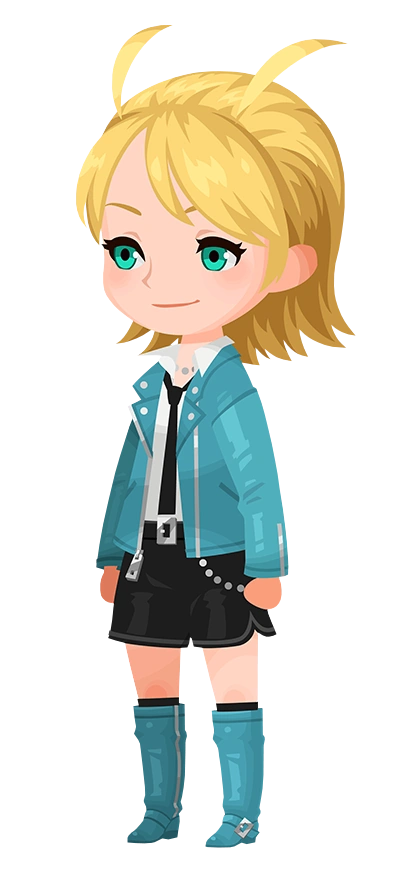

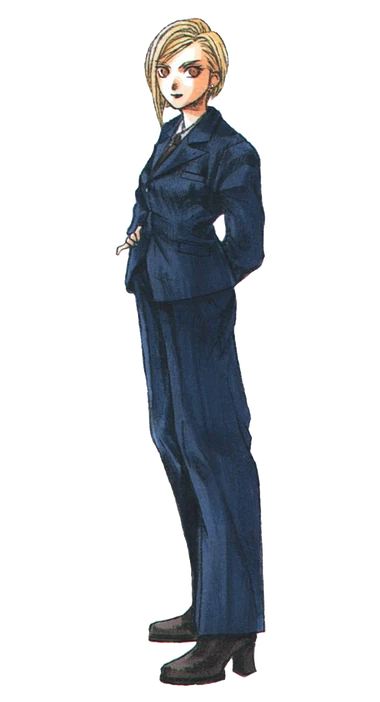
(Note the tie on Elrena and the EXTREMELY similar names)
Or with Axel presumably being based off of Reno, even being given a similar personality
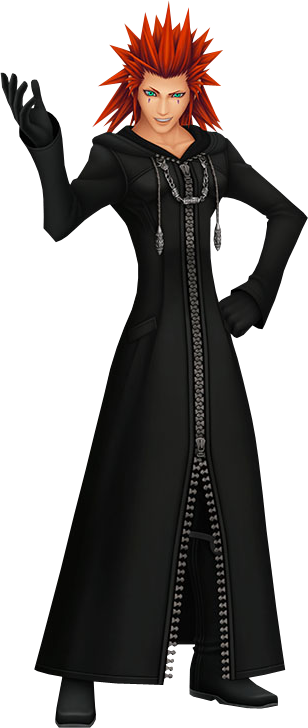
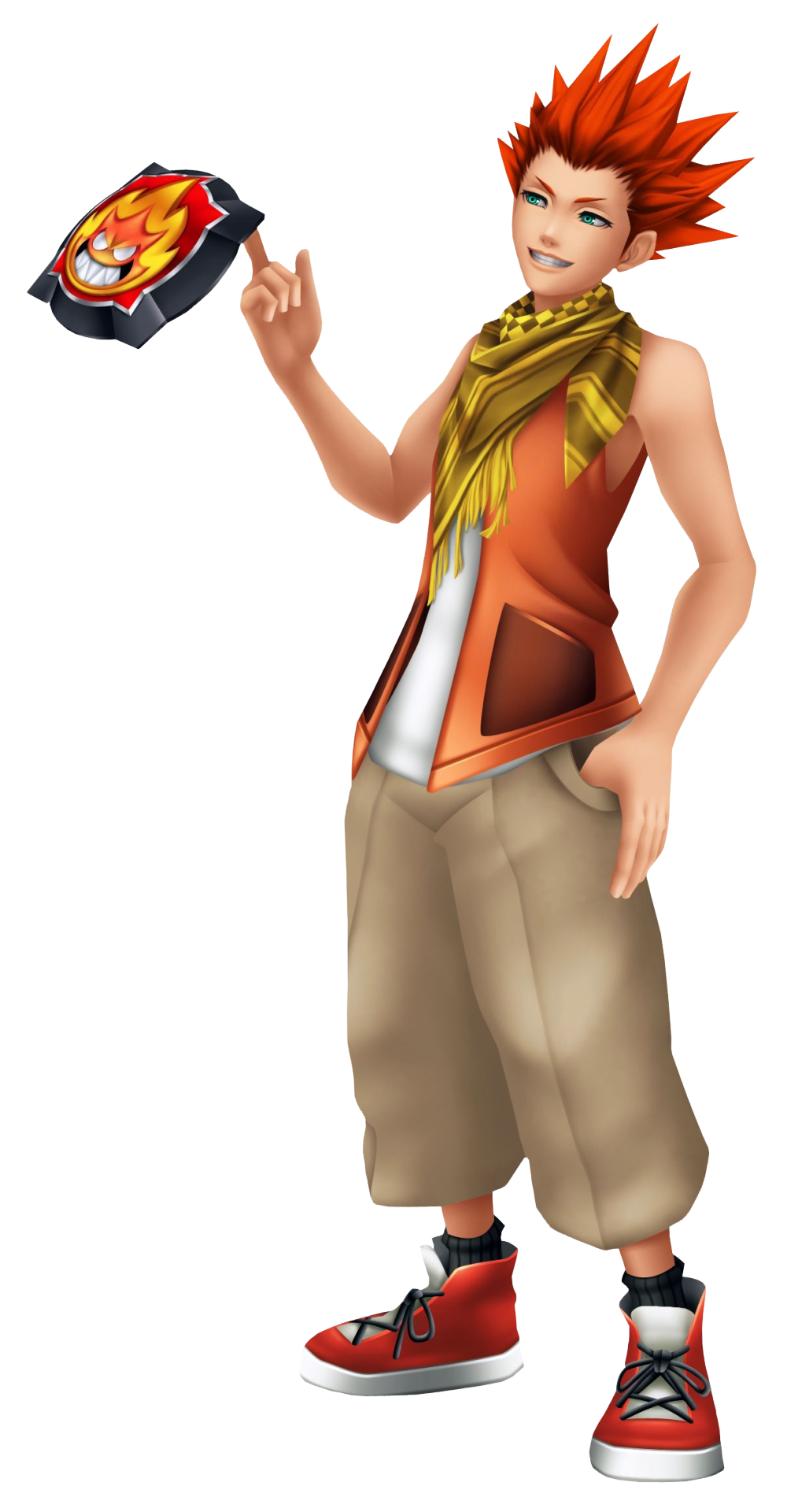

And how they’re all part of shady organizations with a set uniform, vaguely spy inspired tactics, and unique weapons
(Also the orgs while “finding hearts and changing names because they feel like they changed too much kind of ties into some of ff7’s overall themes of identity and the way your allies/friends/family change the way you perceive yourself but that isn’t super important to this discussion)
What is important is this:
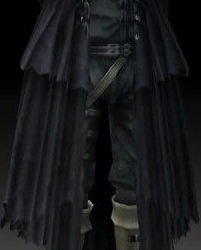
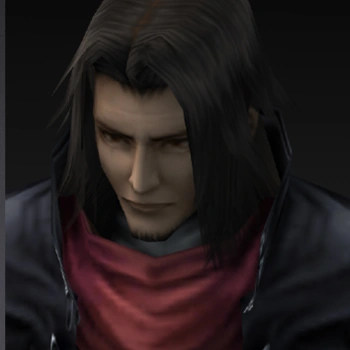
Look at Grimoire. Note Grimoire’s center part, long-ish hair, and the way his chin juts out a little. Puzzle over the fact that he’s a scientist adjacent. Let it stew in your brain for a bit
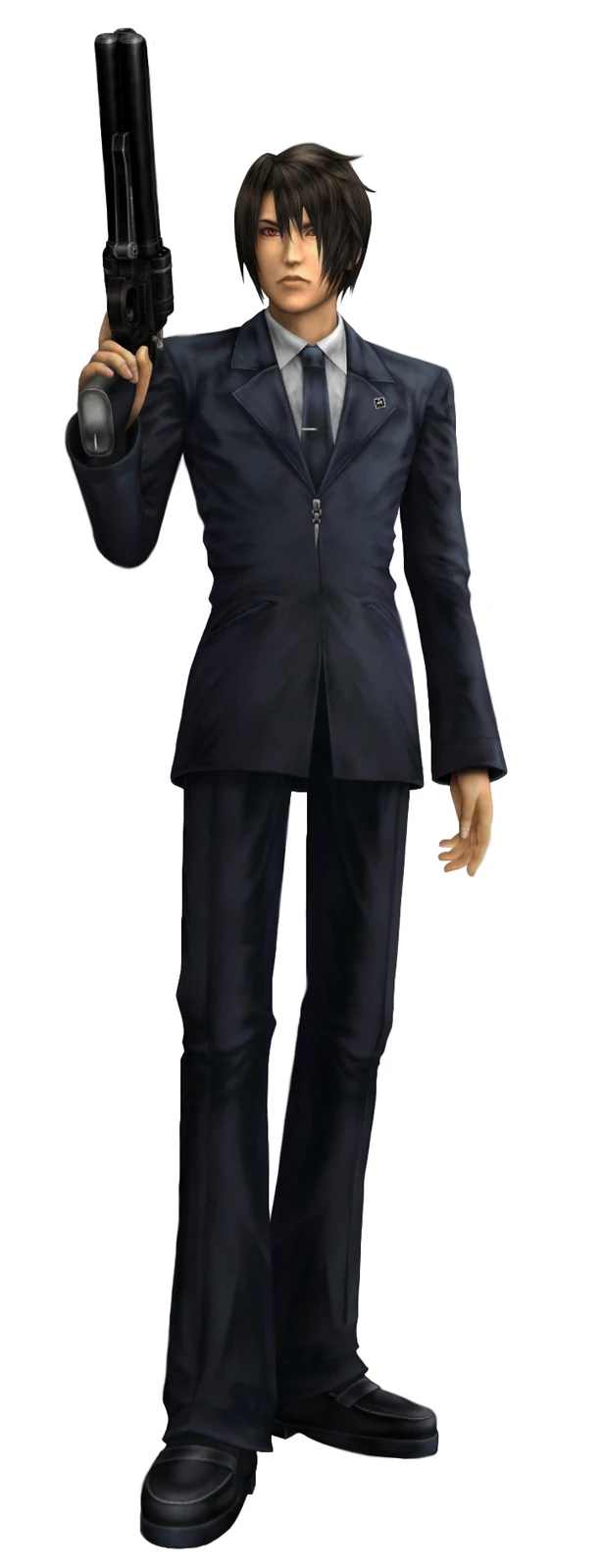
Now look at young Vincent. Look at the way his hair lays on his face. Look at his silhouette
These two remind you of anyone?
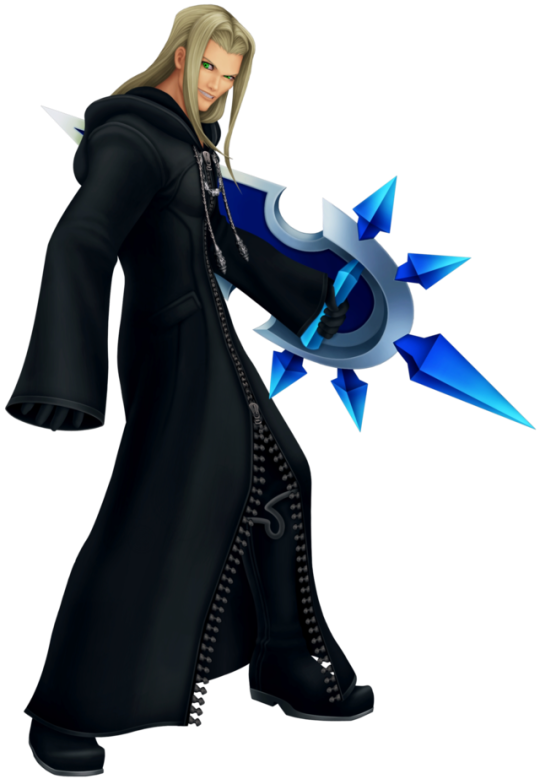
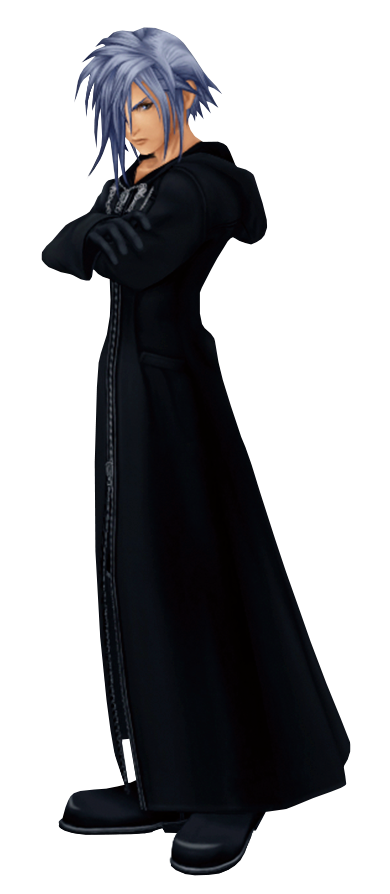
BOOM
Now any viewer hearing this might say “man they’re reaching. The evidence seems pretty superficial,” too which I say…. You know what that is totally fair. But rationally only stops me a quarter of the time and this is not that
Now we all know KH is Nomura’s baby, so he presumably did most of not all of the character designs. He’s also well known for doing the big character designs in Final Fantasy 7, so it doesn’t seem implausible for him to have taken some inspirations
Additionally, Re:Chain of Memories came out around a year after Dirge of Cerberus
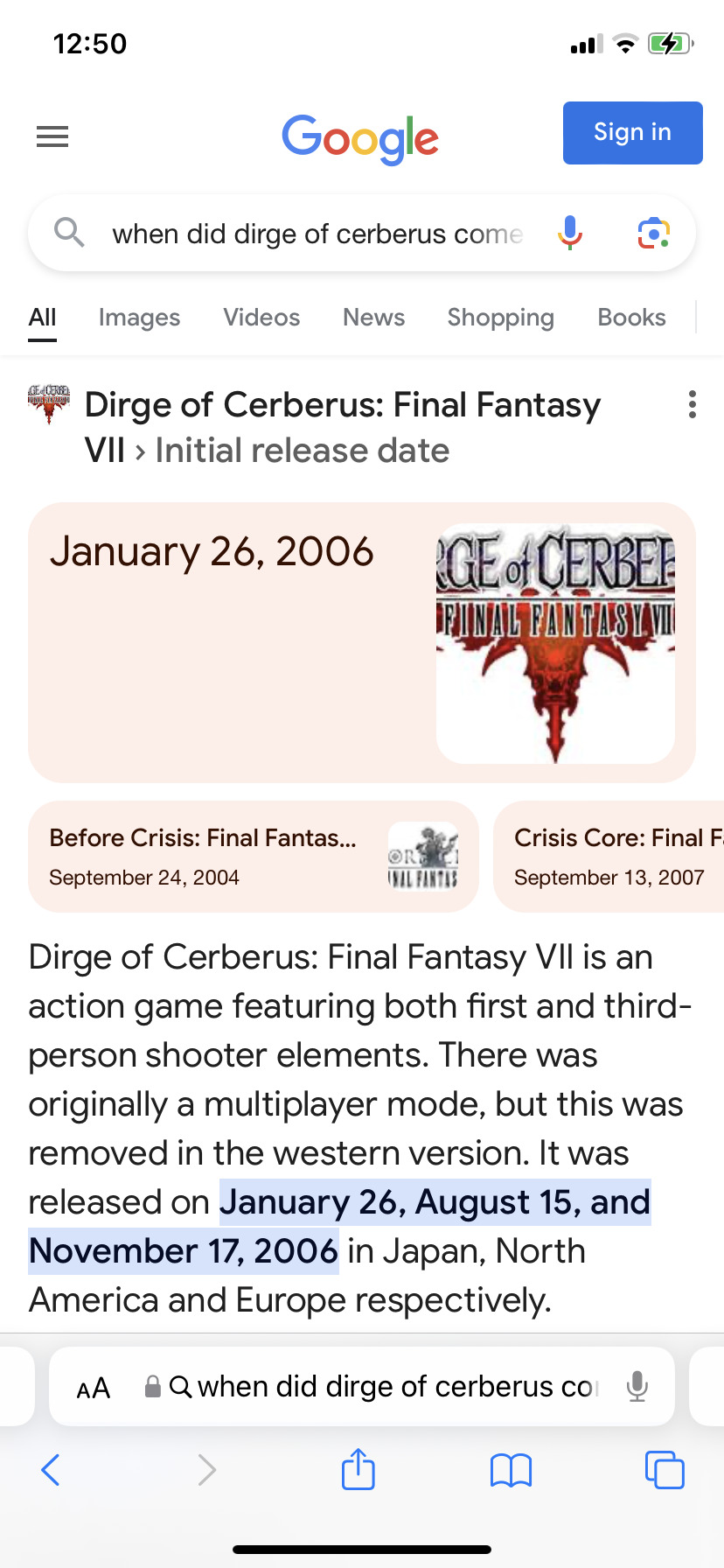
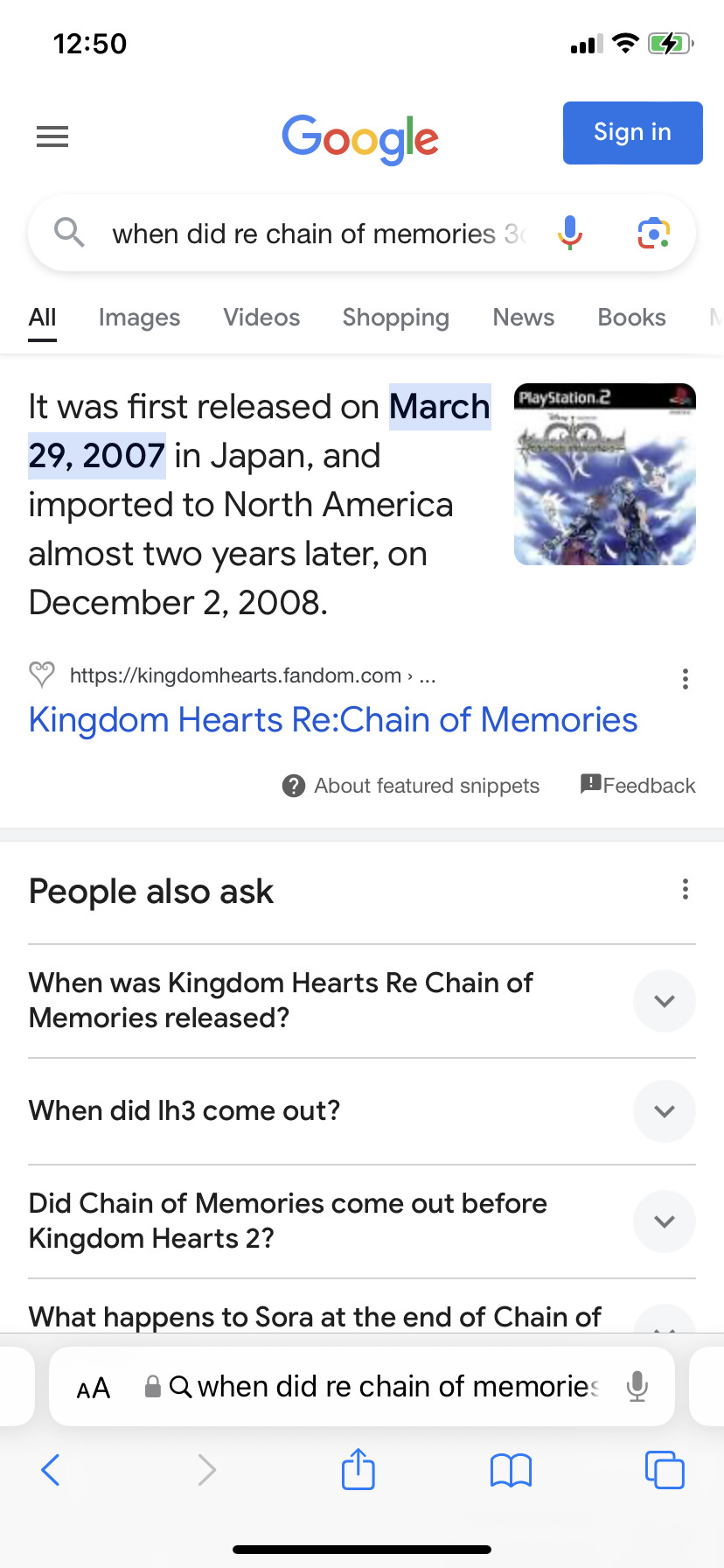
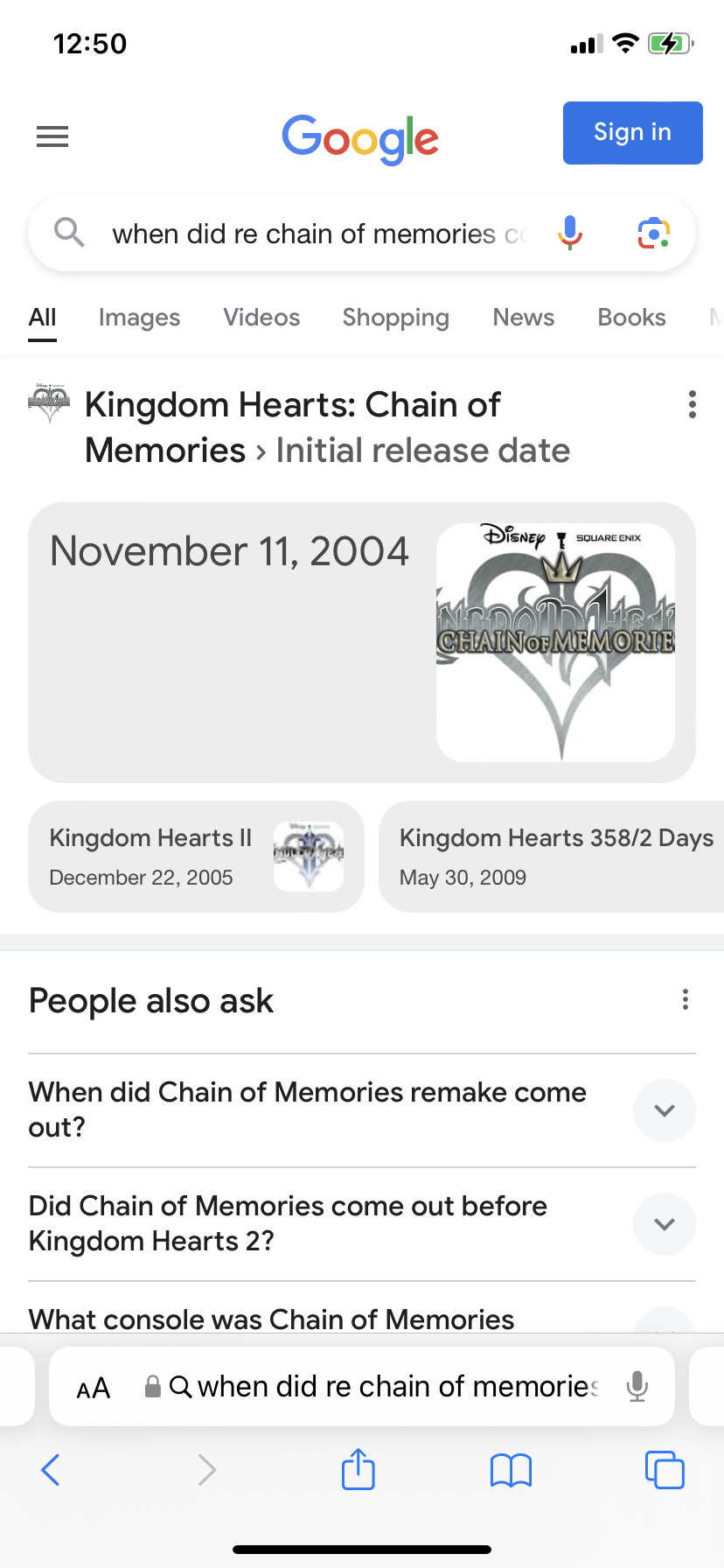
(Original CoM came out like 2 years before, but it was in pixel art, and it isn’t crazy to claim they were in development/early concept at the same time. And who know, maybe Grimoire was based in Vexen/Even and not the other way around)
(The rest of this post is just extra info so you can skip it if you want)
I omitted adult Ienzo because he’s only in Unreal, and the switch had some pretty big facial structure changes for the org, as exemplified by Luxord
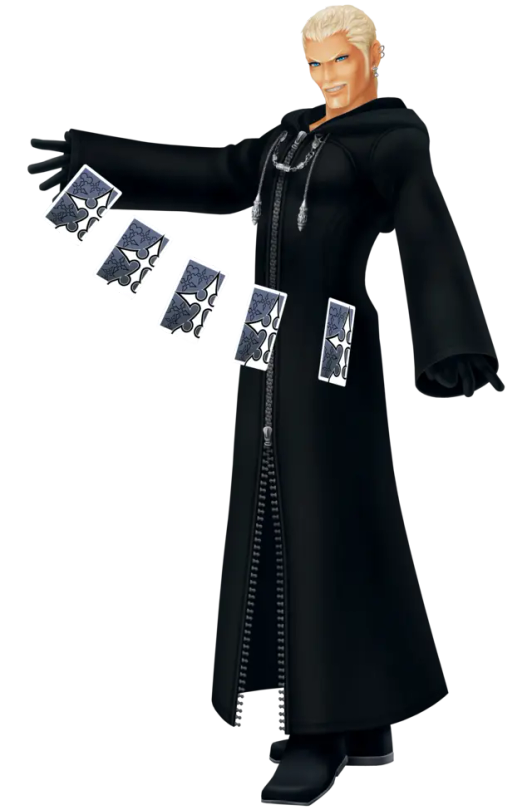
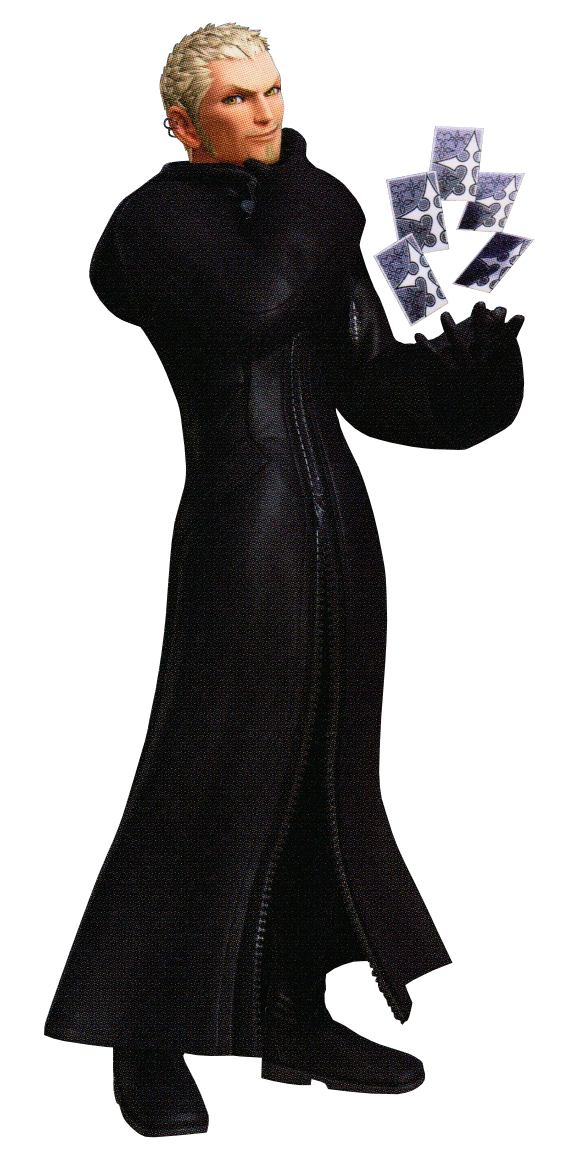
Also it might just be that older men were just Modeled Like That™ but it doesn’t really apply to the other org members so who knows
Anyway here’s a gallery of images that were omitted because they are either in totally different engines or just not relevant bcuz of time period
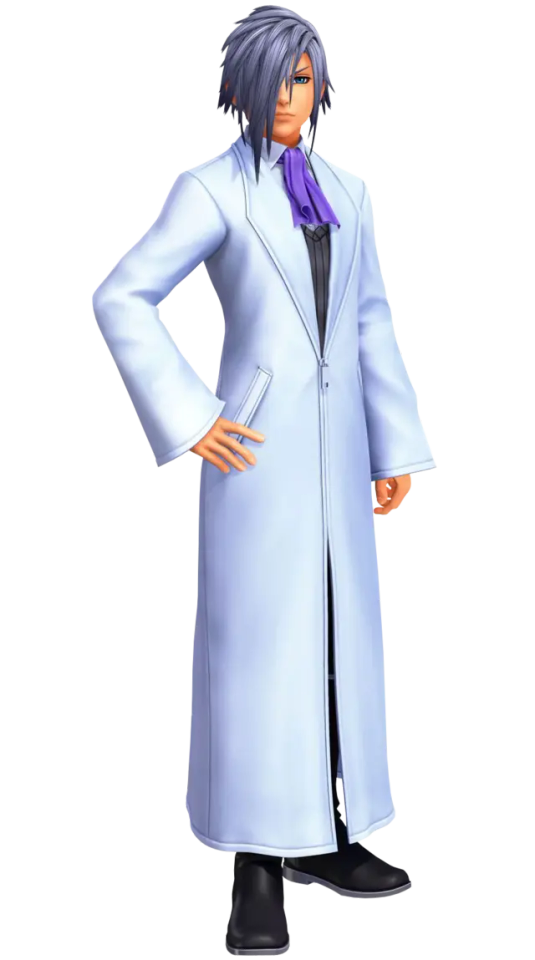
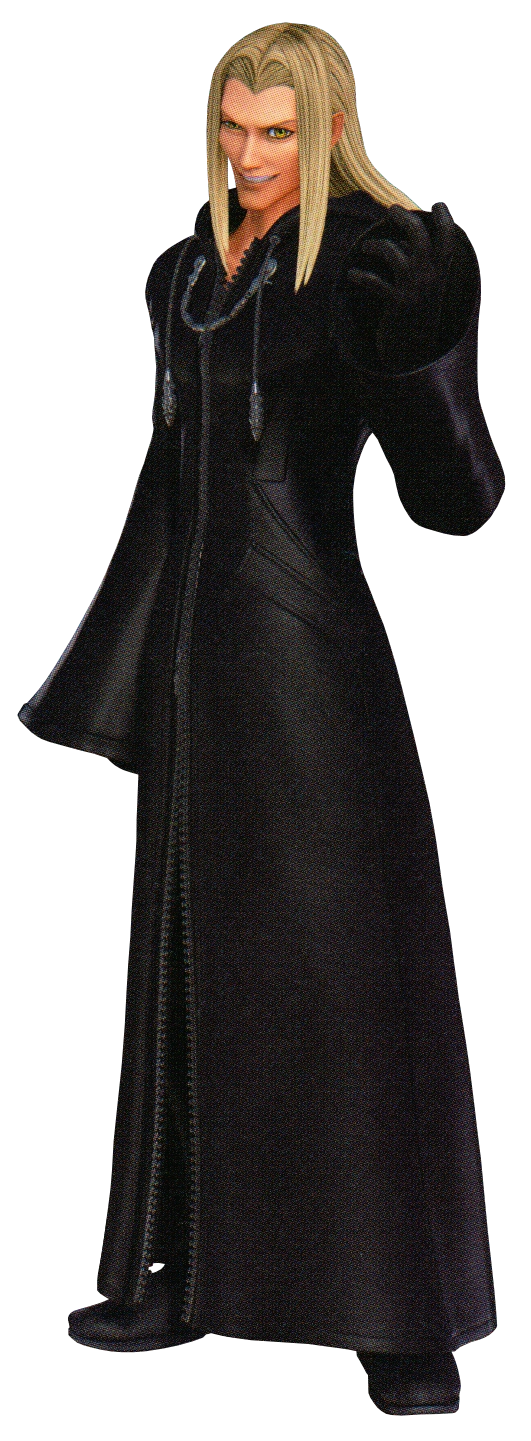
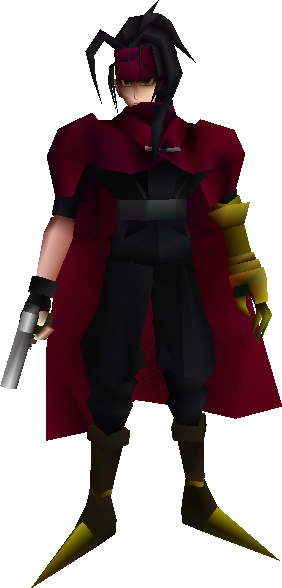
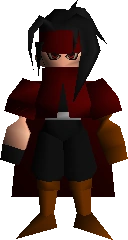
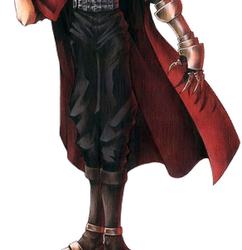
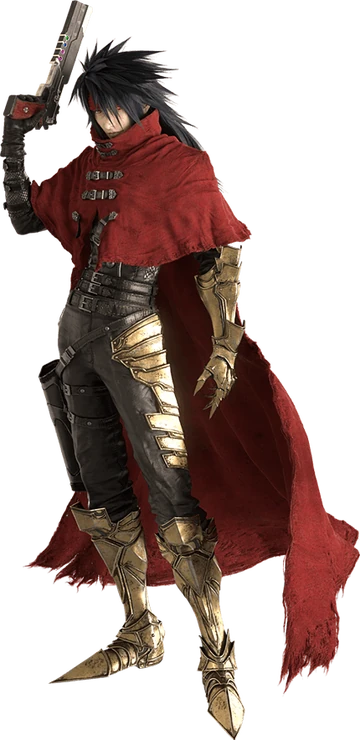
Anyway all this is to say there’s a decent change Ienzo will look like THIS
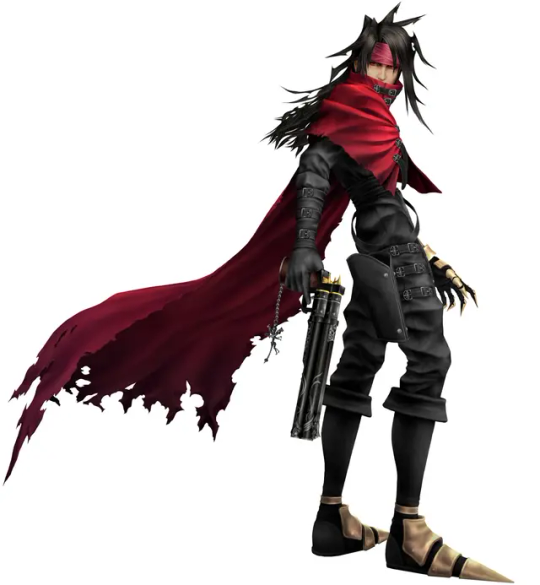
in a future game
Thank you for coming to my TED talk
#game analysis#kind of#kingdom hearts#not art#final fantasy 7#ff7#vincent valentine#grimoire valentine#zexion#vexen#kh vexen#kh zexion#ienzo#kh ienzo#chain of memories#dirge of cerberus#ff7 spoilers#dirge of Cerberus spoilers#minor spoilers#not really spoilers but I’m being careful because of remake and the new fans it’s drawing in#btw doing all the image descriptions for this was hellish but I want this to be as accessible as possible#sorry for the over tagging I just want this to reach the right audience#long post#like really really long#btw I might be crazy but my first instinct upon seeing Grimoire was “omg Vexen” so I thought it was worth diving into a bit more
11 notes
·
View notes
Link
Why Only Tifa Can Repair Cloud’s Mind
#Cloud#Tifa#Cloud and Tifa#Analysis#Canon#CloTi#Tifa and Cloud#Lifestream#FFVII#FF7#Final Fantasy VII#Final Fantasy 7#Final Fantasy VII Remake#Final Fantasy VII Rebirth#Final Fantasy 7 Remake#Finall Fantasy 7 Rebirth#zack final fantasy#Aerith Gainsborough#Sephiroth
18 notes
·
View notes
Text
Today I'm gonna play: Final Fantasy 7 Remake
If my previous posts aren't obvious yet, I love RPGs, specifically JRPGs! First one dating all the way back to FF 1 itself, but on the PSP. I fell in love with the cute yet cool sprites, and this feeling of exploring a fantastical world filled with adventure. I watched the original FF7 on YouTube as a kid, and Cloud was my favourite protagonist for the longest time! I still love him, but after playing more FF titles over the years, I'm actually on the fence because there's a lot of great protagonists in this series! My memory's hazy with the plot but I know the main points, so I can't do many comparisons with the original.
So far I've reached chapter 11. Despite the total gameplay time being approximately 33 hours which sounds short, there's quite a bit to do in the game. The main campaign takes its time, while periods of ''rest'' allow you to take on side quests that add onto worldbuilding. I'm not a fan of side quests in general for the repetitiveness of ''go to X place'' or ''fight X monsters'', and FF7R still has this, but the narrative gives this community spirit that thrives in the slums of Midgar. Dialogue and characterization is massively fleshed out compared to what I recall in the original. And from what I've also seen in FF16 (even though the dialogue is divisive), I think both games can be considered a new standard for writing going forward in the series.
I don't need to get into character designs for this game, they're iconic as is and are nicely enhanced. The new characters Leslie and Rosch are also nicely designed for their purpose (and characterization too), although I do think Leslie stands out quite a bit compared to the other NPCs, I wonder why.
Combat wise, in terms of post FF X (I've watched 16 but not played) or their turn-based systems, this is the most decent combat they've put out so far. Comparing to their other titles I've played (15, Strangers of Paradise, Lightning Returns), I think they've nailed it. It's not my favourite action combat in general, but it does its job. Cloud moves swiftly when I thought he'd be slow, and the other characters play smoothly too, even if there are mechanics that try to slow you down such as charging attacks and the ATB system which provide a nice sense of strategy for those that like turn based combat. I can't say that this does satisfy that turn based itch though, as I found myself needing to do the action bit despite the Classic system settings turned on. I'm not complaining though, as I do tend to enjoy action RPGs more than turn based.
I see that Masashi Hamauzu has returned to work on the music, and hearing the new arrangements have been great so far! Not one track has disappointed me so far, and I like the variety of instruments and versions used for tracks too. Like the motorcycle chase level.
Apart from all the praising, I do have a few gripes. I've noticed a few transitions that occur such as when you rest on a bench, which take way too long to complete before getting back to the overworld. I've also seen some repetitiveness with these slow segments in the level design too, such as going through small spaces, or walking on a thin plank/pipe. I was okay with it a few times, but with the amount of times this occurs, I wasn't too sure what the point was of adding them other than to pad the length, or create an artificial loading screen, or it could be an artistic choice in which then the last two are valid. A game that I've seen that does this well is Mirror's Edge. Small spaces are used often but don't take long to go through, and you're required to balance on pipes to provide some challenge while quickly getting to the other side. I've also noticed that there's no memory cursor in the commands, which RPGs pretty much have as a cursor. It's a bit irritating especially when healing, to have to manually navigate to the party member and select them, rather than automatically have them as the selected option first for quicker input. It's not like FF has never had this before, so it's a strange decision to leave it out.
But apart from that, I've been having a good time! I'll probably have to take a break from RPGs after this though, and go for other genres or shorter games, I'm sensing a RPG burnout coming up!
Also, Wall Market was amazing.
Terms exclusive to the game:
ATB (Active Time Battle) - A type of turn based system that existed in the original FF7 and uses gauges as turns.
Classic system - A game mode in the remake that allows your characters' actions to be automated while you can focus on the ATB aspect.
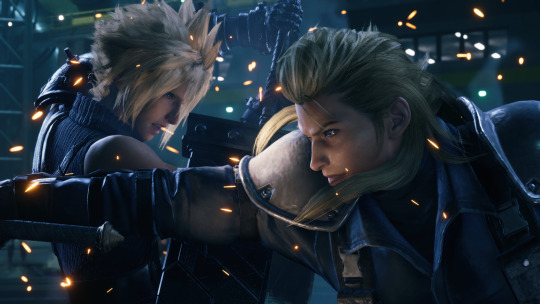
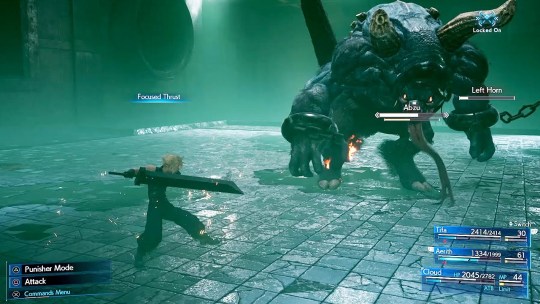
youtube
1 note
·
View note
Note
If Clerith is canon, then how come there only exists the possibility for Cloud to kiss Tifa in the game? At the point where Aerith is still alive. And as for your question about why Aerith needs to die like in the original, it’s partly because she needs to be in the Lifestream to summon Holy. There’s also the fact that Final Fantasy 7 is a game about loss and finding the strength to still live despite said loss. Aerith’s death works because she was a character who loved life, and thus to see that vibrant spirit suddenly snuffed out is tragic. And as for the whole Clerith vs Cloti thing, the Sector 5 dream date kind of puts a wrench in that with Aerith’s dialogue about “knowing where they stand” and the difference between “liking someone and liking someone”. The love triangle is an illusion that ends when Cloud regains himself, and the player can no longer choose dialogue options for him. Nojima seems to be going full steam ahead with Cloti and Zerith in Part 3, and while it’s fine not to prefer that, that’s what’s happening.
The reason why I question the choice of killing Aerith again is because the devs have said that dying is a fate/promise that Aerith is desperately trying to escape. Couple that with the fact they promoted Remake and Rebirth so far with posters as, “Defying fate,” and making the characters say “the future isn’t set in stone”. Near the ending of Remake you the player gets to defeat fate. Introducing alternative worlds where Zack and Biggs are alive. Implying that even if Cloud didn’t save Aerith in his world there is another world where she did survive and that Aerith is waiting for him. All of this sweet build up and for it to what? To go down the route of, “psych, no you cannot change your life. You need to give up and resign to whatever is coming your way.” Giving hope to not follow through with what you have been hinting at isn’t good storytelling. It’s pure sadism. But no matter. I am relatively confident that Aerith will get her wish. To live long happy life with her friends and Cloud.
Zerith is a ‘couple’ that doesn’t exist. It was created by certain shippers to get Aerith out of the way without being overtly hateful to her. Aerith is allowed to have somewhat complicated feelings to Zack without her feelings for Cloud being diminished. Zack may have been her first love, but there is no doubt that Cloud is her true love. That is clearly established in the alternative world where Marlene says Aerith is In love with Cloud. This is even further hammered down when Aerith has the opportunity to fight with either of them near the end of Rebirth but while she heals Zack she chooses to stand by Cloud and with him fight against Sephiroth. Zack himself has accepted that Aerith moved on. He wants Cloud to save her and not let her die. If only people more understanding like him.
As for the kiss you speak of. Nojima said that all the Gold Saucers dates are separate from the main story and more similar to dating sims. The fact that the kiss did not change the relationship between Cloud and Tifa in the main story shows it should be treated like it never happened. No impact means not relevant. It’s interesting you believe that is the direction the game is going. We each can have our interpretation and can only wait for the part 3 game in a few years to confirm whose analysis is right. Until then I say goodbye, anon.
18 notes
·
View notes
Text
FF7 Rebirth, Existential Horror, and Cait Sith
It's been a couple weeks since Rebirth has come out and people have analyzed the ending, but I'd like to tackle an angle that hasn't really been discussed - Cait Sith actions as a setup for concepts that are later subverted, both in the original and in the remake continuity.
If I popped my clogs, they'd be sobbin' in the streets at the Saucer. This beautiful body's but one of many!
- Cait Sith, Final Fantasy 7: Rebirth
In the original game, Cait Sith's death serves a dual purpose. Not only is it the turning point for his character arc and where he really allies himself with the party, but it sets up a concept for a rug pull. Cait Sith No. 2 comes along and replaces the first in order for the player to let down their guard and assume that death in this story can be reversed.
However, there is a sadness that undercuts the scene. Cait Sith No. 1 is shown to have been his own unique entity. When he dies, that's it - No. 2 might also be a Cait Sith, but he's (debatably, anyway) his own person. Notably, he affirms his own individuality when there's nobody else around to hear him. Despite his death being undone minutes later, a character's life was still lost. It's also more than a little existentially terrifying. How much of this little guy understands what happened prior? Does he have the original's memories of being crushed to death? Did Reeve feel anything, watching this little fella give a heartfelt death speech, before firing up Cait Sith No. 2?
And so the narrative rug is set - Cait Sith gives his big speech, he sacrifices himself, then comes back to life. Players internalized this (along with the dozens of Phoenix Downs in their back pockets) when Aerith's death scene comes around. There was no speech, there was no sacrifice, and there is no coming back. And I'm pointedly calling this a death, not a sacrifice. She didn't go there knowing she would die. Her last words spoken on screen are "I'll come back when it's all over."
There's plenty of stuffed toys like my body around, but there's only one me!
Don't forget me even if another Cait Sith comes along.
- Cait Sith, Final Fantasy 7
In the remake, there's a distinct lack of any mention of Cait Sith individuality. For all we know, the multiple Caits Sith are being controlled by a central computer, or the cloud, or whatever. The important thing is that (in english, at least) Cait Sith's didn't actually die - his body was simply destroyed.
I'm loathe to speak authoritatively on what this actually means in the Rebirth continuity if we're to assume the narrative utility of Cait Sith's death is consistent between adaptations, but it is a potentially interesting angle for analysis. The next story beat after the reveal that Cait Sith can body surf is the Cloud and Aerith Dream Date, where the pair of them not only enter the bodies of their alternate counterparts, but also appear to hop into different worlds.
This isn't even touching on what it could mean for Aerith's death, either. If the original Cait Sith's death was meant to set up the idea that death is cheap, only to pull the rug from under you when Aerith bites it, what does it mean in the Remake continuity? Is Cait Sith's casual acceptance of his disposable body doubles a mirror to something? Maybe Sephiroth's usage of the Black Robes? Aerith's ambiguous survival? Or was it just to seed the idea of the multiversal Dream Date?
It might have lost the existentially terrifying implications, but perhaps it simply exchanged them for another set of horrifying implications.
Oops! This looks like I came at a bad time!
- Cait Sith watching Cloud fuck up, Final Fantasy 7
13 notes
·
View notes
Text

Despite #SquareEnix's tendency to keep things under wraps, a recent entertainment analysis firm Ampere report suggests that #FinalFantasy7 Rebirth is not performing well.
While Square Enix has yet to make any official statement, data on the number of daily active users on PS5 indicates that Rebirth has barely crossed the 2 million mark since its lackluster launch on February 29th.
This starkly contrasts its predecessors, as the original PS4 version of #FinalFantasy 7 Remake sold 3.5 million copies in three days, while another #PS5 exclusive, Final Fantasy 16, sold 3 million copies at launch.
These figures highlight Rebirth's underperformance and raise questions about #Sony's management of its exclusive titles.
3 notes
·
View notes
Text
Part 6A: The Facets of AVALANCHE – Jessie & Tifa [A Complete Analysis of Final Fantasy VII]
Welcome to part 6 of my complete analysis on Final Fantasy VII. As always, I am treating this entire series as one cohesive rumination. Please head to this masterlink for the earlier parts before reading further.

In the last two instalments we covered: the peak reveal of the Shinra/AVALANCHE conflict; Cloud’s first (revealed) rescue of Tifa; and the meeting of our two heroines (Aerith of the external conflict and Tifa of the internal conflict). We ended on a brief overview of Reeve and Cait Sith, and will now continue from the former’s protest in Shinra HQ. I’ve split this chapter into three parts as a bridge toward the Plate drop, concerned primarily with Remake’s expansion of the members of AVALANCHE. Part A (today’s post) will examine – after a brief section on Shinra – Jessie’s arc, Barret & Tifa (in terms of motives), and Jessie & Tifa’s friendship. Part B will cover Wedge, and Part C Biggs. We will get to Barret in depth when we tackle the Plate drop.
Note that when I refer to “AVALANCE” in general, I am talking about these five characters collectively (not the entire organization as introduced in Remake).
Part 6A: The External Plot
After Corneo springs his trap and our main trio falls into the sewer, we have a conversation directly in Shinra HQ between the President, Heidegger and Reeve. In our earlier chapters we discussed the President and Heidegger as inhuman governors of Midgar. Now we have Reeve – Shinra’s Department Head of Urban Planning and the head architect who constructed its mako reactors – protesting against their plans.
Recall Jessie’s quote to Cloud on the train after our first bombing:
人間の知と力のしょうちょうね。このミッドガルは – “A symbol of humanity’s power and wisdom. That’s what Midgar is.”
Midgar is “humanity’s power and wisdom”. Reeve is the man directly behind that power and wisdom. Reversing the quote, therefore, Reeve embodies Midgar’s humanity. Reeve manifests Shinra’s “humanity”, while the President and other department heads manifest its inhumanity. Thus we have for the first time, a juxtaposition within Shinra: paradoxically the Company (as its own entity) is both human and inhuman. We’ve noted that the Turks perform inhumane acts on the job (ie. as ‘Shinra’) and humane acts outside of the job (ie. when they aren’t Shinra). We’ve seen AVALANCHE’s grey morality even as they’ve opposed Shinra. But now for the first time we see humanity within Shinra, and that that humanity comes from within its very heart – represented by none other than the man behind the establishment and running of Midgar.


What then can we say of Shinra? That Shinra the entity, like every character in FF7, has its own inner identity conflict. This struggle will be shown through Reeve and Cait Sith, and later by Rufus through his presidency and the post-game narrative of Advent Children. In addition our glimpse of hope for Shinra in Reeve, we also have our first mention of Midgar’s mayor. We will meet the mayor personally on our later mission to rescue Aerith, but for now we just hear that he “sits in [the Shinra] building” as a hostage.

Reeve is immediately silenced and brushed off as though he is the problem – our glimmer of Shinra’s humanity is immediately crushed by its lust for power, and its inhumanity is displayed in full by the President’s statement:
We’ll destroy Sector 7 and report that AVALANCHE did it. Then we’ll send in the response operation, care of Shinra, Inc… Heh heh heh… this is just perfect.
Heard throughout this scene are Shinra’s two leitmotifs in the track Shinra Company.
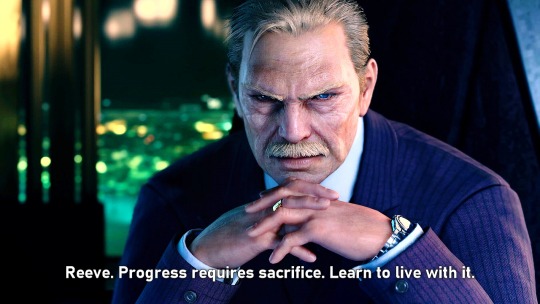
Carrying out the Company’s inhumanity, of course, will be the Turks. We will return to them later once we’ve come to the battle for the pillar. But let me note one last thing of importance: although the Turks are the legs of the mission (and it will majorly affect their character journeys), this is ultimately Heidegger’s doing – it is Shinra within.

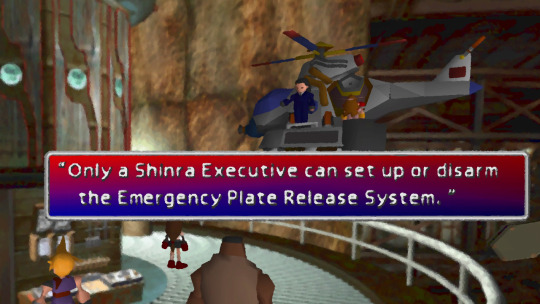
Now I’m going to jump ahead a bit. Seeing we are approaching the death of AVALANCHE, I thought now the best time to consider Remake’s arcs of Biggs, Wedge and Jessie. Or, more specifically, what they tell us of AVALANCHE as an entity.
Each member of this triad embodies one of the organization’s three facets that channels the basis of their fight for the Planet:
Jessie’s arc is concerned with the theme of restoration, redemption, and retribution; it looks to set rights to the past.
Wedge’s arc is centred on collective comradery; in being ‘useful’ to his friends and helping to make a difference in the present fight.
Biggs’ arc looks to preserving the Planet as a home for the orphans of Sector 5 and beyond; the trajectory of his outlook is toward the future.
Now we’ve touched on Jessie’s journey in brief already, but let’s flesh that out. Firstly, recall that Jessie, like Tifa, provides a moral voice on AVALANCHE’s actions – the difference being that Jessie’s quandary arises after the bombing of MR1 (Tifa having “never [been] on board with the bombings”). Jessie’s moral conflict, therefore, rests on a hope for redemption. (As does Tifa’s, in a different way, but we’ll get to that in a later post.) Jessie concludes that if she had “used a weaker blasting agent”, then the casualties of the explosion could have been avoided.
Jessie: Deep down, I know it was my fault. I used a more powerful blasting agent than the directions called for. It had nothing to do with the mako.
Cloud: Let's say you're right. So what?
Jessie: I'm planning on using a weaker blasting agent this time. But...since I can't get in touch with my supplier, our only option is to loot a warehouse owned by Shinra.
Jessie is willing to endanger her life – and thus the next bombing mission (where the group needs her) to secure a weaker blasting agent. This is with the hope of somewhat redeeming herself for her (perceived) mistake at MR1 in ensuring that MR5 doesn’t result in the same casualties. The irony, of course, is that Jessie was never at fault, but she will carry this guilt to her death, going so far as to view her death as retribution.

On this quest to the warehouse, we learn of Jessie’s personal desire for restoration.
Biggs: Jessie's dad was in there, right?
Cloud: Yeah.
Biggs: Mako poisoning. Happened while Jessie was doing a show at the Gold Saucer— Ah, but what do you care?
Cloud: No, I wanna hear it.
Biggs: Jessie always wanted to be an actress. Worked her ass off for years until finally she caught a break. Top billing. Parents were thrilled. And then...right before opening night...
Wedge: Her dad had an accident.
Biggs: Collapsed from overwork... and in the worst possible place. Mako storage. Lay there half a day before someone found him. Been like that ever since. No change whatsoever. That's what got her into planetology, and led her to seek out Avalanche. How far we've come...
Wedge: Jessie's got a theory about it. Thinks her dad's spirit is stuck now—between his body and the heart of the planet. So if we don't shut down the reactors soon...
Biggs: He'll get caught up in the flow and...poof.
Here we learn three things. Jessie gave up her lifelong dream to join AVALANCHE – right after finally achieving it. Like every FF7 character, something significant was taken from her because of Shinra. And we learn her personal motive for joining AVALANCHE: to restore her father’s life.
Also, her ‘let’s go let’s go’ attitude toward the bombings is explained. She literally believes she is on a timer in terms of her father’s fate.
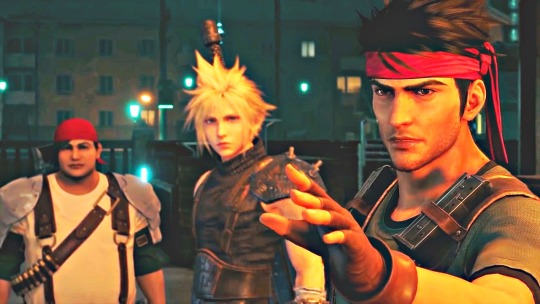
Now it is important that revenge against Shinra was not Jessie’s main driver for joining AVALANCHE. Some players believe every AVALANCHE member is driven front and center by revenge. This is not true. The only character who has revenge as his primary drive is Barret. And what I mean by this is that, behind his façade, Barret desires revenge over saving the Planet. This distinction is immensely important in setting apart his character arc.
Here is a section of Jessie’s dialogue from Traces of Two Pasts (many thanks once again to pekotranslates for this translation):
“I want to stop the reactors. Bomb them or something. Biggs hates Shinra anyway. He’ll do whatever it takes as long as it gives them some trouble. But there are a lot of ordinary citizens who’ll get caught up in our mess too. That’s why we’re still not ready yet. Wedge says he’ll follow me and Biggs. Our hearts are all in it, but we’re just going in circles. If someone were to ask me at the meeting, 'Okay, so what does the Sector 7 Slums Chapter—that’s what we call ourselves—feel is your aim, and how are you going to achieve it?’ I don’t think I can answer that question.”
Jessie – and Biggs and Wedge – are genuinely driven to save the Planet. (We are told here that “Biggs hates Shinra anyway” and will “do whatever it takes as long as it gives them some trouble”, but Remake will give glimpses of his personal life which emphasize a wholly different, selfless motive.) Jessie’s personal goal, as Remake has revealed, is to rescue her father from mako poisoning. Her means – not drive – to achieving that goal is “to stop the reactors.” Is revenge a part of it? Yes. But to whatever degree, that is secondary.
Moreover, despite feeling she is on a timer, Jessie will always put the people first. They are what keep her from taking action in Traces of Two Pasts. They are what bring her to the warehouse at cost of her life and mission. Often overlooked by fans, Jessie truly has an empathetic heart.

Now let’s focus for a moment on the two lines I bolded: “But there are a lot of ordinary citizens who’ll get caught up in our mess too. That’s why we’re still not ready yet… ‘how are [we] going to achieve it?’ I don’t think I can answer that question.” Here is where Barret comes in (Jessie, in fact, is saying all this to Barret and Tifa, and it is immediately after this line that Barret offers to be their leader). Jessie, Biggs and Wedge feel unready to act on the offensive against Shinra because they are concerned with the possibility of civilian casualties. Barret, in complete contrast, desires vengeance above all else:
“They took our families and our homes from us. Everyone says it was Avalanche’s doing but I know it’s all Shinra. I’m gonna blow ‘em up into a million little pieces! Talking about the mako reactors—Got that?”
Barret says this to Tifa when begging her to introduce him to Jessie (Barret having zero connection to AVALANCHE and Jessie being the only person from AVALANCHE whom Tifa knows). Note the psychology he uses in the sentences that immediately follow:
As they walked on, he pointed towards a reactor.
“If we don’t do something to stop them, they’ll destroy the planet. Those reactors are draining the lifeblood from it. I never really paid attention until I started studying Planetology. But, no matter how you look at it, you just can’t go off and fight Shinra on your own. You need people on your side. We can do anything. Not alone. But we can if we work together. Ain’t that the truth?”
Jessie had told her something similar inside the container. She broke into a smile.
“Come on, Tifa. I’m begging you. I think this is the kinda ‘connection’ Marle’s always talking about.”
Barret first blurts his plain desire for revenge and his means of achieving that revenge (“Talking about the mako reactors”) in a very assertive manner (“Got that?”). Then he asserts that “those reactors are draining the lifeblood from [the Planet]” – turning the conversation to ‘the fight for the Planet’. Then he personalizes the conversation with general “you” and “we” pronouns – as if Tifa is wanting to fight Shinra too and if he and she and Jessie (AVALANCHE) can work together, then they can stop Shinra – through a tag question where he expects a yes response (“Ain’t that the truth?”). Tifa’s yes is only too easy. She buys into Barret’s psychology, connecting his words to a conversation she had with Jessie. This is classic-Barret convincing others of his façade – his façade of ‘saving the Planet’ which masks his fuelling quest for vengeance.
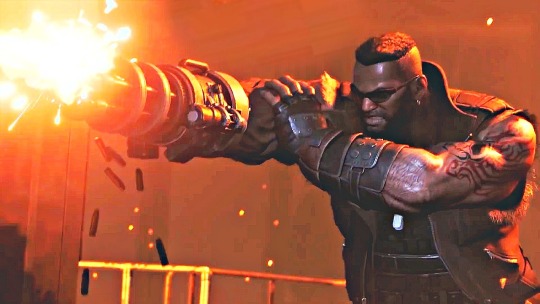
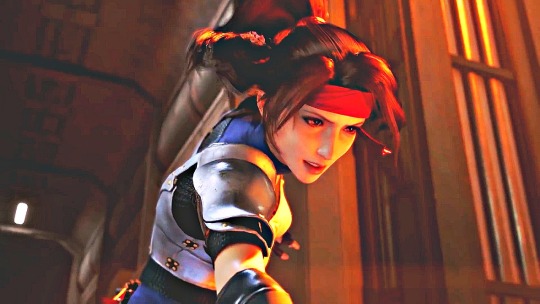
In comparing Jessie and Barret’s dialogues, we can understand why Barret was chosen as leader. Jessie, Biggs and Wedge share the desire of saving the Planet, which is exactly Barret’s outspoken façade. The difference lies in their ideas around achieving this goal. The triad’s concern for the “ordinary citizens who’ll get caught up in [their] mess” prevent them from being “ready yet” to act: “…but we’re just going in circles. Barret, whose mind is strung on Shinra’s destruction under the ‘greater good’ image, thus fulfils the drive of guiding them into action.
“The point is you need someone who can take charge and be a leader, not just for you but Avalanche as a whole.”
“Yep. That’s exactly what I mean.”
“I’ll do it. Yeah, I’ll do it.”
“If you say so,” Jessie chuckled.
“You won’t know unless you make a move. What works, what doesn’t, or what kinda reaction you’re gonna get. You can fix problems as you keep on rolling. The worst thing you can do is to be too smart and overthink things. Let’s get moving. Let me give you that push forward. Ride on my back.”

I’m going to digress for a moment and turn to Tifa, because I believe the FF7 fanbase has misinterpreted her character in pertinence to AVALANCHE: saying that Tifa joined AVALANCHE out of a desire for revenge and still wants that revenge. Now by “revenge”, I mean as the dictionary puts it: “the action of hurting or harming an entity in return for an injury or wrong suffered at their hands.” Does she harbor hatred for Shinra? Absolutely. But not in the sense of “make them pay” vengeance. I am aware of the secondary sources (developer interviews etc.) in which the term is used. However I think this term has been greatly misapplied. Some of you will disagree with me and that’s fine, but I believe attributing the characteristic of revenge to Tifa’s character takes away from who she is at core. I do not say this to make her a flawless angel (she is far from flawless and that is part of what makes her so lovable). So, before you click away already, please hear me out here in my whole argument.
Here is the first part of her conversation with Jessie which she relates Barret’s words to. Note that it takes place before Tifa even knows that Jessie is in AVALANCHE.
Tifa sat down on the bed as well. After some thought, she let her emotions take control and began to tell her story from the moment the Soldier lost his mind and set fire to her village until the present day. The more they talked, the more it stirred up feelings of regret. Shouldn’t she try to find out the truth about that incident? And yet, she even felt like her debt was a form of escape. Once she got it all out, she wept.
“You’re working so hard. Yep. I don’t know a single soul in the slums who’s worked harder than Tifa Lockhart!”
Encouraged by Jessie’s words, Tifa sniffled.
“And you’re not running away. I’m pretty familiar with the incidents that occurred due to Shinra’s doings, but I haven’t heard about Nibelheim. Which can only mean one of two things: Shinra hasn’t made it public or they’re trying to cover it up. You don’t stand a chance. No way you can handle them alone. Don’t be reckless.”
“Alright…”
“I’m sure you can avenge your father. I’ll help you. Not right away, though.”
She hadn’t really thought that far ahead. But talking to Jessie inspired her. She gripped the leather bracelet around her wrist.
“Why are you being so nice to me?”
“Hmm, I wonder. Maybe I’m just nosy? You’re in trouble, aren’t you? Oh, but I don’t have any money, so don’t get your hopes up about that!”
Jessie encircled an arm around Tifa’s back and squeezed her shoulder in a hug. Depleted after the long talk, Tifa abandoned herself in the embrace.
“We can do anything. Even if it’s not possible on our own, we can make it happen if we join forces.”
Since that time, she would spend time with Jessie once or twice a week. Sometimes Wedge or Biggs would be with them.
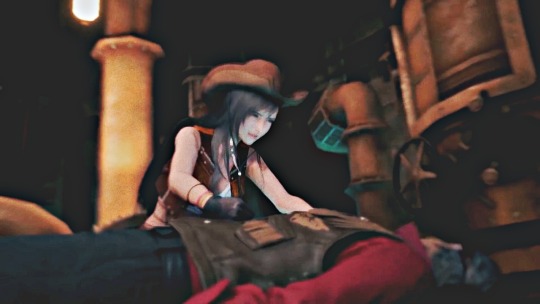
There are two key things to note here:
1. Tifa, after her home is destroyed, had no vengeance on her heart. She is only stirred up by “feelings of regret” and confusion as to even trying to “find out the truth”. Jessie misassumes that Tifa wants revenge, and Tifa, not having “thought that far ahead” feels a sense of inspiration to move forward. Moving forward is the main theme of her arc in the novel, portrayed in her: taking control of her life in Nibelheim; and in rebuilding her life after Nibelheim. Tifa’s inner conflict at this point is her feeling that she is running from everything (Jessie’s encouragement being: “you’re not running away”). This conflict, in seeking resolution, is urging her to take action in “try[ing] to find out the truth about [Nibelheim]”. Does she hate Shinra? Very much. The game tells us countless times. But revenge had not even crossed her mind. Moreover, vengeance would be a backward step in her moving forward – for vengeance is motivated entirely by retaliation and letting the past consume the present.
2. But talking to Jessie inspired her. This statement follows Jessie’s line, “I’m sure you can avenge your father. I’ll help you.” The question is, inspired her in what? Vengeance? Or something else? Nothing in rest of the conversation is about vengeance. Nor does Tifa ponder any thoughts about vengeance. In fact, nowhere in the entire book – told entirely from Tifa’s perspective – is a desire for revenge mentioned at all on her part. What we gather in the remainder of the story, rather, is Tifa emphasizing her connections with the members of AVALANCHE – ie. her friends who encourage her and give her further purpose to move forward.
“Surprised you stuck with [Barret].”
“Because, you know, we had a connection. That connection led me to meet you too, Red.”

A Planetology seminar follows days after Jessie and Tifa’s conversation. After the seminar, we get this:
If that [Planetology] was what Jessie believed in, then she wanted to believe in it too. But something still didn’t feel right.
“In other words, what I’m trying to say is, your dad didn’t just disappear. His life force is with the Planet, and our hearts are connected with the Planet. If you have love for the Planet, then you’ll always be connected with your dad. I was just wondering if you might consider that.”
They stood in the silent darkness of Container Alley.
“Nibelheim is right here with you, and your dad is right here with you too.” Jessie cupped Tifa’s face in her hands. Her touch was warm. “You’re not alone.”
Tifa placed her hands on top of Jessie’s and said, “I haven’t been alone since the day you first came here.”
Jessie’s eyes widened. Flustered, she broke away.
“Oh my god! That’s so sweet of you to say!” She brought both of her hands up to her cheeks, looking extremely flattered. “Well, see ya!”
Jessie walked away, her cheeks still pressed in-between her hands.
Tifa realized that she had forgotten to check to see if Jessie was a member of Avalanche, but felt strongly that it didn’t matter.
Note the last line. Tifa felt strongly that it didn’t matter. It – strongly – didn’t matter that Jessie was in the anti-Shinra group. If Tifa had in the slightest been inspired to seek vengeance from their first conversation, then we would have gotten the exact opposite of these thoughts.
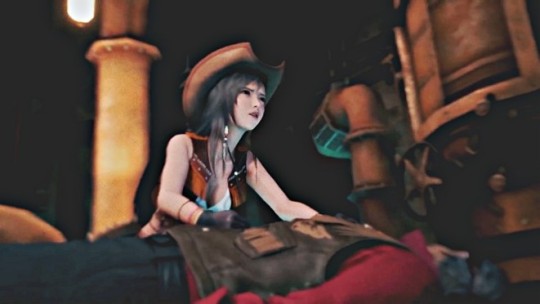
With not a single mention of Tifa wanting revenge in the entire book – which, let me emphasize again, is written entirely from Tifa’s own perspective, in both retro- and introspective account by Tifa after the Midgar events – the only plausible conclusion is that her attributed ‘vengeance’ was something stirred up by Jessie and Barret. And I say ‘attributed ‘vengeance’’ because of Tifa’s own view of herself in On the Way to a Smile: Case of Tifa. (Which was also written by game scenario writer Nojima in 2009.)
It is here where FF7’s fanbase has misread her character. From the official English translation of On The Way to a Smile:
[Tifa] came to loathe Shinra and Sephiroth so much that it hurt. It was the easiest decision in the world to join Avalanche. Because of her grudge. Not to save the planet or humanity. The anti-Shinra and anti-mako slogans she shouted were just a righteous front for her own dark motives.
But even in the name of defending the planet, too many lives were taken. Never mind of the purpose of settling a personal vendetta.
Alright. So Tifa herself directly attributes her joining AVALANCHE to a personal vendetta. Exactly. Tifa does this. Tifa herself. Who’s entire inner conflict in this book consists of two things: building a life with Cloud and their family; and personal redemption due to survivor’s guilt. Tifa’s account of herself here is on judgement day as Meteor is coming down. Like her recounting of conversations in Traces of Two Pasts, these thoughts take place many events after the Plate drop – the inciting incident of her survival’s guilt and atonement journey. In other words, Tifa retrospectively – in a state of utter despair, regret, self-loathing and guilt – ascribes her motives for joining AVALANCHE to a selfish lust for revenge. When we now know through Traces of Two Pasts – where she was not in such a mental state – that a personal vendetta wasn’t even a thought. The context is absolutely key. Of time and place, and Tifa’s state of inner confliction.
That day, the chosen day. Meteor, hurtling down from distant outer space, the Lifestream erupting from the planet to meet it above Midgar.
Just let it wash away everything, Tifa remembered thinking. My past. Our past. And me, too.
Tifa’s is so overcome with guilt and despair that her thoughts are suicidal.

Now let us consider the framing of this ‘personal vendetta’ passage above. It begins with this:
She, too, had believed that Avalanche’s lofty goals were worth the sacrifices. Along with the others, she’d buried the twinges of guilt beneath the narcissism of self-sacrifice, beneath the belief that she was putting her life on the line for the “greater good.” That made everything fair game. With the dizzying pace of the events that followed, Tifa and the others never had the luxury to stop and think. And as their battle against Shinra gained its terrible momentum, another foe joined the fray. His name was Sephiroth…
We then, after brief summary of the party’s journey, have our ‘vendetta’ paragraph, which is followed immediately by:
The guilt, she knew, lay coiled within her, and she could only wonder how she was meant to go on living with that suffocating embrace around her heart. As she looked to what would soon be the ruins of Midgar, Tifa feared for her future.
Guilt is what is at the center here. Overwhelming, unbearable, to-the-point-of-wishing-for-relief-in-death guilt. Thus, it makes very plausible sense that in her greatest moment of self-loathing, where she literally wishes herself dead, Tifa – known for being unsure of her own feelings and how to deal with them – attributes to herself the motives of her comrades, which she, as a fellow member of AVALANCHE, by the world is assumed to have. This attribution, in other words, is the only one she finds herself able to latch onto.
Note also the other phrase I bolded: “Tifa and the others never had the luxury to stop and think”. The irony here is that Meteor is literally hurtling down toward the Planet. Here, in this moment – the most overwhelming moment possible – Tifa doesn’t have the luxury to stop and think. It would be ridiculous to think she had could keep a clearer head during a world apocalypse than when exchanging life stories with Aerith on a cargo ship.


So in summary, here is my argument:
Both novels are narrated by Tifa in retrospect following the Plate drop: Traces of Two Pasts after leaving Midgar; and On the Way to a Smile during and subsequent to Meteorfall.
Tifa in Traces of Two Pasts is in a sound mental state and relays her joining AVALANCHE as being out of: her personal connections with its members (her friends); and a resolution to moving forward – to join their fight for the Planet.
Tifa in On the Way to a Smile is not in a sound mental state, and is – as is and will be constantly enforced throughout FF7 – someone who struggles to deal with and take action in pertinence to her feelings. (This is one of her greatest character flaws.)
In other words, Traces of Two Pasts presents Tifa as a reliable narrator, while in On the Way to a Smile she is an unreliable narrator. She joined AVALANCHE for: her connections with its members; a way of moving forward; and a means of helping to save the dying Planet. Never for revenge.
Why did I make such a long argument for this? Because it is a misconception that takes away from who at heart Tifa is – a compassionate, nurturing, self-sacrificial friend and mother figure. It doesn’t make sense that Tifa, who “was never on board with the bombings”, who not once dehumanizes the workers of Shinra, who risks her life to personally protect our Shinra Middle Manager whom she does not view as an enemy, who feels not just sympathy or empathy but compassion for every suffering person she meets, would have joined AVALANCHE out of an agenda for vengeance – something which would have spurred enthusiastic action toward, at the very least, blowing up the reactors.
わからないのは自分の……気持ち – “What I don’t understand is my own… feelings.”
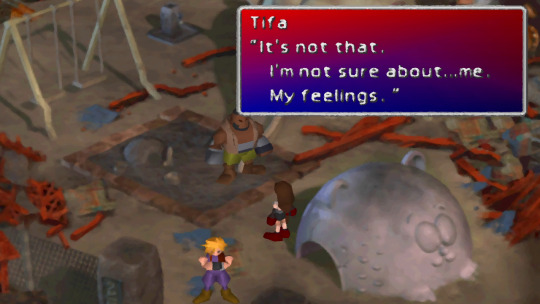
Alright. Now that we’ve looked at revenge’s place in Jessie, Barret and Tifa’s journeys, let us tie them together.
In our earlier conversation where Jessie, having lost her father to a coma, appeals to Tifa’s loss of her father as a basis for vengeance, we got:
“I’m sure you can avenge your father. I’ll help you. Not right away, though.”
Because Tifa had said nothing about such a pursuit, and Jessie is fully aware of Tifa’s true conflict – assuring her that she is “not running away” from it – the subtext is telling us that Jessie’s so-called ‘assumption’ of Tifa wanting revenge is in part a projection of her own wish for revenge. (Though recall, as Remake established, Jessie’s primary objective is to save her father – my point simply being that revenge is simply an element.)
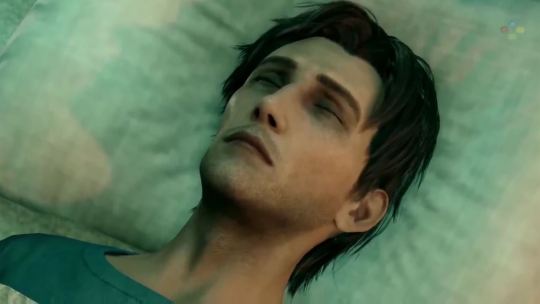
So within AVALANCHE this far, we have the two ends of the ‘vengeance’ spectrum – Barret on the extreme end and Tifa on the non-end. In the middle somewhere is Jessie, who’s genuine fight is for her father and the Planet. And, in light of her empathetic care for the innocent, she may just be closer to Tifa than one might think… We have determined how Jessie’s (and the boys’) unreadiness to act was answered by Barret’s inhesitancy to act – thus establishing him as leader. Let us now look at Jessie’s personal connection with Tifa.
Traces of Two Pasts establishes that Jessie was Tifa’s first friend in Midgar.
After work was over, [Tifa] started walking in the direction of Container Alley. She had to go to work everyday, but the Slums at night was still a scary place to be. Her body was tense from being on constant guard.
“Oh, hey!” A voice called out from behind.
Tifa ducked, and then turned around to find a young woman standing there. A beauty with a slender face and shapely nose.
“Aha! I knew it was you! The Sector 8 Steamed Bun lady!”
She was one of the people in that friendly group of three. Ever since the day they first ordered those twenty-two steamed buns, they would come back to purchase from her regularly. There were times they came together, while other times separately.
“Miss.”
“Call me Jessie. Jessie Rasberry,” she introduced herself, placing her hand on her hips and posing with a bit of flare.
“I’m Tifa. Tifa Lockhart.”
“Wow! Even your name is cute. How old are you—Seventeen?”
“Sixteen.”
“Off work today?”
“Yeah.”
“Um, do I make you nervous?”
“Not at all. Well… maybe.”
What she really wanted was to talk to her more—She even longed for it. But Tifa wasn’t quite sure how to express her feelings.
Jessie was Tifa’s first female friend ever, in fact, and the first she looked up to.
“Jessie, do you practice martial arts?”
“Huh? Oh, you mean that kick? Neat, wasn’t it? They had it on the action training program. But that was the first time I actually struck a person. I’m an actress, you see.”
“What?!”
“Business is temporarily closed now though.”
“I believe you.”
“Is it because you’re in such awe of my beauty that you’re convinced I’m an actress?”
“Yes.”
“Aww! That’s so sweet of you to say!” Jessie gave a carefree laugh. Tifa found herself laughing along too.
Jessie was the person through whom Tifa met Biggs and Wedge. And she was the first person in Midgar who gave her security.
Since that time, she would spend time with Jessie once or twice a week. Sometimes Wedge or Biggs would be with them. The glutton she met that first day was Wedge, and the other man, Biggs. Through these three, she formed other acquaintances who told her of safe places she could go to eat late at night.
An outfit was chosen for her based on Jessie’s selection, and Jessie was also the one who trained Tifa on proper posture and how to walk on stage. Until then (according to Biggs, at least) she was like a small animal on alert.
And, recalling parts of our earlier passages:
If that was what Jessie believed in, then she wanted to believe in it too.
Jessie cupped Tifa’s face in her hands. Her touch was warm. “You’re not alone.”
Tifa placed her hands on top of Jessie’s and said, “I haven’t been alone since the day you first came here.”
Tifa realized that she had forgotten to check to see if Jessie was a member of Avalanche, but felt strongly that it didn’t matter.

Tifa’s love and compassion (to and from) Jessie specifically, in huge part, lead her to join AVALANCE. In juxtaposition, her love and compassion for all people caused tension between her and the group. (However, as revealed by Jessie’s empathetic nature, not as much as players may think.) Now I wish to tackle what I believe another fan misconception – that Tifa and Jessie’s friendship drifted apart by the time of Remake due to their moral differences. I disagree, for two very clear reasons. But first, an important clarification must be taken into account regarding the AVALANCHE moral quandary. (Shout out to chasandy on Tumblr for wracking my brain on this, and to whom I dedicate this little friendship section.)
First of all, as we’ve already explored, Tifa and Jessie were never on the same moral objective (Tifa rejecting vengeance; Jessie embracing it). So their ‘drifting apart’ in terms of that context, so to speak, does not actually exist, for they each held their differing views right from the beginning, and Jessie understood Tifa’s “running away” confliction perfectly well. Just as we see in Tifa’s friendship with Barret throughout the game, Tifa and Barret’s moral disagreements never impact their love for one another. There is no reason at all to conclude that this is not the same with Tifa and Jessie.
Now onto my reasons for why Tifa and Jessie’s friendship did not drift apart.
First, in these two scenes, where the narrative is a classic master at ‘show, don’t tell’.
Jessie: Hey! You see the news? "The reactor bombing was the work of the eco-extremist group 'Avalanche.'" Public enemy number one! Gets your heart racing, doesn't it? They don't know our faces, so we're in the clear for now, but we'll wanna capitalize on this momentum. Speaking of which, you coming on the next one?
Cloud: For the right price.
Jessie: Oh, you can bet I'll be pushing hard for a raise!
Cloud: …
Jessie: Tifa'll be joining us too, but I dunno... Even a blind man can see her heart's not in it. She was never on board with the bombings, so if it comes down to do or die... If I've got to put my life in someone else's hands... Then… I'd rather that someone was a professional. Like you.
Cloud: I heard you're having second thoughts.
Tifa: I know we have to think big if we're going to make a difference. But not like this. I just... I feel trapped.
Cloud: If it feels wrong, don't do it.
Tifa: Guess that's that, then.
Cloud: What, they kick you out?
Tifa: We agreed to disagree. So—you want another drink?
Barret: Tifa! Time to celebrate! Break out all the good stuff!
Most players picked up on the subtext of Tifa’s conversation with Cloud. For those who missed it the first time, Cloud’s flashback to the promise scene spelled it out – “I feel trapped” being a direct reference to their childhood promise.
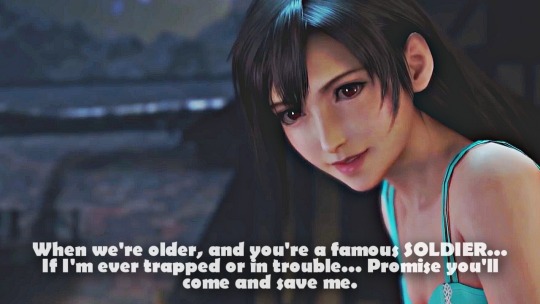

We noted the significance of the camera angle back in chapter 2, with the direct close-ups of Younger and Older Tifa paralleled perfectly from Cloud’s POV.
In Cloud’s conversation with Jessie we have a shot direct from Cloud’s POV also. However, the significance of this one has been hugely missed by most players.
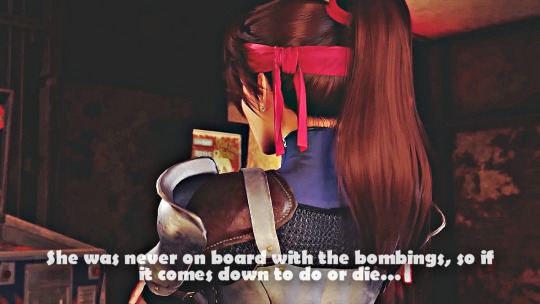
This is the only shot in a direct conversation where Jessie is not looking at her addressee. In fact, I would go so far as to say, that in this particular POV shot Jessie cannot look at Cloud.
See the video below for this conversation, and pay attention to a couple of things:
Notice all the hesitations as from the moment Jessie talks about Tifa she turns completely away from Cloud. Why is this so significant? Two reasons. First, Jessie is at every other time in the game upfront – especially with Cloud. Second, and moreover, she is an actress; a master at masking her emotions. (What an awesome foilism to Tifa’s character there by the way.) This is the only shot in the entire game (to my noticing) where Jessie has her back to the camera in conversation – here, she cannot hide her emotions over her friend, enforcing just how much Tifa means to her.
Notice also the context. Tifa is not coming on AVALANCHE’s mission because her moral compass is stopping her. Jessie is taking the mission with utmost seriousness, after having (self-assumedly) messed up with fatal consequences on the prior. Then notice this same context in Tifa and Cloud’s conversation: their disagreements are entirely centered on AVALANCHE the entity. And as highlighted by Barret’s interruption (“Tifa! Time to celebrate!”), this has zero impact on Tifa’s connections with the gang. In fact, Tifa hosts and ‘mothers’ her friends right after their tense meeting, even though they are celebrating together as “AVALANCHE”.
youtube
Second, we have Jessie’s death (which I’ve also linked below). Players say that Jessie and Tifa’s friendship is less than that in Traces of Two Pasts. I say that players haven’t been paying close enough attention. The entire conversation upon Jessie’s death is framed around Jessie and Tifa’s friendship.
The first word spoken is Jessie’s name by Tifa. The last word spoken is Jessie’s name by Tifa. And these are Tifa’s only verbal contributions.
Likewise, Jessie’s part in the conversation begins with her remark on Tifa crying, and turns again to her remark on Tifa crying moments before she gives Cloud a final quip.
The scene begins with Tifa calling out, “Jessie!”, to have her respond, “Oh, jeez... Tifa... If you could see the look on your face...” (In Japanese, “Oh jeez…” is やだ… – a very strong way of expressing “No…” In this context, our dying Jessie really doesn’t want Tifa to see her like this.) Jessie’s final words are, “Oh no... Tifa's crying. Did I say something wrong? Don't you guys... have somewhere to be? It's not polite... to stare... you know...” It is then that Tifa utters Jessie’s name again before breaking down completely.
Tifa: Jessie!
Jessie: Oh, jeez... Tifa... If you could see the look on your face... [to Cloud as he picks her up] So...you're the guy...who gets to hear my last words... Heh... Lucky me.
Cloud: Like hell they're your last.
Jessie: It's okay, Cloud... It's okay. They were my bombs. They were all...my victims. I had it...coming.
Cloud: …
Jessie: My hero. So gentle...
Cloud: Just try to hang on!
Jessie: [chuckles] So dramatic... I...I just wish that... I could've had you over again... Everyone... With Mom's cooking... I really wanted...to believe...we could...
Cloud: Yeah. You owe me a pizza.
Jessie: [chuckles again] That's right. I do. But...I don't think...
Jessie: [turns to Tifa] Oh no... Tifa's crying. Did I say something wrong? [to Cloud] Don't you guys...have somewhere to be? It's not polite...to stare...you know...
Tifa: Jessie...

Now I say players really haven’t been paying attention is when I hear comments like this: “If Jessie and Tifa were ‘such good friends’, then why did Jessie only joke around with Cloud when she was dying even though Tifa was right there?” Comments like this show that players completely missed the point. Jessie makes two direct attempts at talking to Tifa, you see. Two attempts to which Tifa responds in Tifa-fashion – a fashion we are told of in their very meeting in Traces of Two Pasts (“What she really wanted was to talk to her more—She even longed for it. But Tifa wasn’t quite sure how to express her feelings.”)
Where are these two attempts in Jessie’s death scene? First, at the very beginning. Jessie immediately tries to lighten Tifa’s sorrow at finding her in the rubble (the “Oh jeez…” line). In fact, Jessie doesn’t turn any attention to Cloud until he is carrying her. Then later again, in quipping on Tifa crying, Jessie attempts a final goodbye with the same light-heartedness. Both times, she fails, for Tifa is too distraught to say anything. I see no rift, but rather two very close friends unable to deal with their tragic farewell.

There are also two moments also where the camera makes a point to show Jessie looking at Tifa directly with Tifa in the shot. Note the dialogue at both these times. The first is as she begins to say “I… I just wish that…” The second is while she says “I really wanted… to believe… we could…” before Cloud interrupts with, “You owe me a pizza” (notice too that Cloud interrupted). This first statement seems to carry the subtext of regret, with Jessie unable to look at Tifa beyond the first “I…” The second has Jessie gaze at Tifa for the whole sentence, until Cloud interrupts her. In addition to referring to the whole of AVALANCHE (as is the topic – “everyone” – framed in this quotation), the verbal and visual subtext shows Jessie wishing that she could have spent more time specifically with Tifa.
What is happening throughout the scene, I believe, is this: two close friends are emotionally struggling to say farewell. Jessie, who is good at concealing her emotions (being an actress) is trying but failing to mask her emotions behind light-heartedness for Tifa’s sake; and Tifa, who usually struggles to express her feelings is too overwhelmed by them to do anything but break down. To take this argument further, let’s briefly skip ahead to Tifa’s other two emotional breakdown in Remake.
When Barret tries to comfort her after the Sector 7 fall, Tifa is so numbed by her emotions that she is essentially dead inside. Throughout their whole journey to Sector 5, their visiting the destroyed bar, looking for other survivors, and returning to Elmyra’s house, Tifa refuses to face her emotions and holds them in. It is only in Cloud’s arms in Aerith’s flower garden that she completely allows herself to break down. Aside from the flashback of her father’s death five years ago, there is only one other time where Tifa is shown losing herself to tears. And that is Jessie’s death.
youtube
Of course, in Jessie’s death, comes the climax of Jessie’s arc. What began with a personal primary desire for restoration (saving her father) and personal secondary desire for retribution (avenging her father), culminates into a drive for personal redemption fuelling every one of Jessie’s actions. In the end, we have a tragic reverse restoration inside a retribution, where Jessie – unredeemed yet accepting her death judgement for her mistake – embraces her death and joins the Lifestream, believing that she deserves it).
It's okay, Cloud... It's okay. They were my bombs. They were all...my victims. I had it...coming.
ううん いいんだ…… わたしの爆弾 大勢殺したからね。償わなくちゃ。 – “Yeah… it’s okay… My bombs killed a lot of people… I have to make up for it.”
This is a personalized – no longer optional – echo of Jessie’s OG line:
That’s… all right… Because… of our actions… many… people died… this probably… is our punishment.
もう、いい……いいの…… 私たち……私たちの作戦で たくさん……人、死んじゃったし……きっと……そのむくい……ね。– “We… in our strategy… many… people died… surely… that retribution… right?”
The tragedy, and irony, is that Heidegger was responsible for the deaths at MR1. And this strikes a beautiful chord on the AVALANCHE/Shinra conflict – that ultimately, while Shinra is to blame, AVALANCHE’s actions are in the grey, and that restoration, retribution and redemption are all blurred, interwoven themes within AVALANCHE’s fight for the Planet.

Now some of you may have expected me to delve into Jessie’s flirtatious relationship with Cloud. I will touch on Cloud’s relationships to the AVALANCHE trio in Chapter 8 (where we focus on the Plate drop). But as for Jessie’s ‘advances’ – which I do adore in all the fun and wit – Wedge sums them up exactly:
Wedge: Oh...and one more thing, bro. It's all a game to her. Don't fall for it!
Cloud: You lost me.
Wedge: [chuckles] Life's a stage and love's the play!
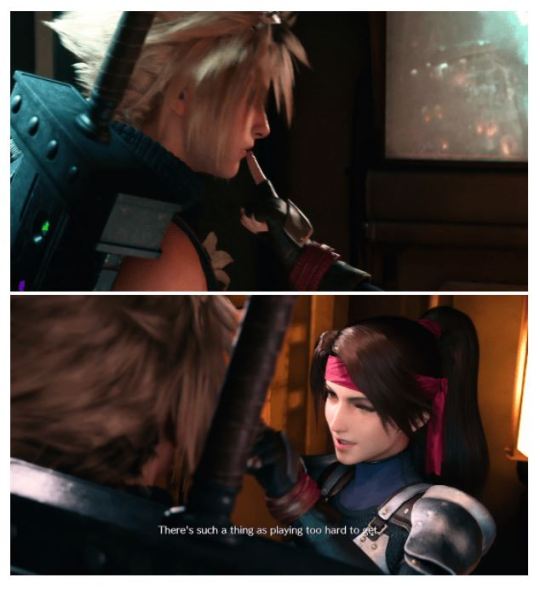
Summary
Jessie, Wedge and Biggs each embody one of AVALANCHE’s three facets that channels the entity’s fight for the Planet. Jessie’s is centered on setting the past right with: restoration of her father’s life and the Planet; redemption for her perceived mistake; and retribution in the fight with Shinra which ultimately results in her death.
Barret and Tifa embody the two opposing ends of the vengeance spectrum, with Barret being the sole AVALANCHE member who holds revenge as his primary motive. Barret’s forwardness was the answer to the rest of the cell’s reservations to act, and thus he became the leader of the group.
Tifa’s motives for joining AVALANCHE are revealed in the complementary novels On the Way to a Smile and Traces of Two Pasts. Where the former presents her as an unreliable narrator the latter presents her as a reliable narrator, attributing these motives to be: her bonds of friendship with AVALANCHE’s members; a way to move forward in terms of her losses; and a means of helping to save the dying Planet.
The next instalment will be up very soon, covering Wedge’s arc. Thanks for reading!
#[mine]#final fantasy vii#analysis#jessie raspberry#barret wallace#tifa lockhart#reeve tuesti#avalanche#shinra
22 notes
·
View notes
Text
Overly Formal Introduction
Welcome to the Tumblr page of Reading Too Much Into Things, a failed Youtube pop culture Archeologist, Archive, and Analysis channel with a primary focus on Japanese Tokusatsu (live action special effects) primary two branches, Kamen Rider and Super Sentai for recap and review purposes. It lasted for, I think, a year and a half. But enough about me, what do YOU think about me?
While I am not on the same side of any spectrum that will land me with an overriding Hyper Fixation, I do have a LOT of media I care deeply about, know an annoying amount about and will over share, or will get very defensive over criticisms over. I refuse to define myself or my personality off of being a fan of one of, or any, of these popular mass medias.
Fate franchise (stay/night, zero, grand order primarily)
Kobayashi's Maid Dragon
Re:Creators
Bleach
Kamen Rider franchise (Faiz, Gaim, Fourze, Anno's Shin Kamen Rider, favorites)
Super Sentai (Deka, Shinken, Kyouryu, Gokai, favorites)
Gundam franchise (G, G-witch, Wing, Build Fighters, IBO, favorites)
Darkwing Duck
Batman: The Animated Series
OK K.O. Let's Be Heroes
Steven Universe
Kingdom Hearts (Birth by Sleep favorite game)
Anime Studio Trigger (Darling in the Franxx is NOT a trigger anime)
Fromsoft video games (have finished Dark Souls 1 & 3, Bloodborne, and Sekiro)
Final Fantasy franchise (yet to finish any mainline title other than 7 Remake part 1)
Ghost in the Shell: Stand Alone Complex
Owl House (I will never forgive Disney)
13 Sentinels: Aegis Rim
Ducktales Reboot
Space Dandy
1 note
·
View note
Note
hey buddy what are your thoughts about the Final Fantasy 7 Rebirth trailer as well as the translation/localization for it as ppl are now getting upset again for who knows how many times.
The trailer itself was interesting! Having played through the OG again recently, I'm curious with how a lot of these next chunks of the story will play out. And of course, where exactly the out-of-context lines in the trailer truly fit within the story.
With that being said, people being upset is textbook. It's what they want and choose to do. It's just even more deafening considering how out of context the lines are or even the conditions of how they were localized in the first place. i.e. was it specifically for the trailer as it is, or were these taken from scenes that are already finished, translated for those lip flaps and timing, etc. Were some lines done retroactively? Was the ENG taken at a certain priority in any aspect, like with FFXVI? If people want to take the time to possibly talk about something, they should try to understand it more, or equally, understand where the dead ends are until more information is available.
As for the actual lines, they're fine, as usual.
Just people complaining about the imaginary “SENA” again, which most likely doesn't even apply in this scenario, as it didn't for the Remake and 90% of SE games in this day and age.
Even the French had differences, as Tifa's line there ironically matches the ENG version, but there's no torches for that. It's funny seeing some people make their translations, which also have their own distinct variations from each other, as per the nature of translation itself. But you have people who really care about how something is said down to the single word, so for some people, the slight variations in the literal translations might matter. Thankfully, I haven't seen anyone doing that to these translators. So far I've taken note of these three, so look at those and thank them for taking the time to translate it for the community. Saves me the time of doing it myself:
Turquoise Hammer
Audrey's (+ video)
Nick Des Barres
Anywho, for those who simply love to spend their time complaining as opposed to the process of understanding—somewhere along the line, people are going to have to come to terms with the practicalities and production of localization in and of itself, and even moreso for SE and how they typically operate even between the different creative branches there. There's plenty of information out there to indulge in that would help build the appropriate mindset to have when talking about localization. But, that's up to the individual and all factors included for them, as always.
Most people I’ve seen personally, it’s more of a conversation about perception once people talk about “impressions”. Which is something to keep in mind of how much it does or doesn’t cross into objectivity or subjectivity. This is for myself as well. The most interesting thing is Tifa’s line and Cloud's Zack line, but the most notable difference is the absence of Zack’s name being said by Cloud and the confusion that may cause. But, everything else is fine.
I have my own personal thoughts on that, but otherwise, some things are logical, and shouldn't take a whole ass analysis to uncover, a whole explanation to just spell it out. But I'll do it anyway, for those who need it or are interested in analyzing the languages without hateful bias. If you're as tired as I am of seeing people just accuse the localization of all these wrong things without any type of analysis of the actual languages to back up these claims, well, then maybe this will be appreciated. The trailer stuff was interesting enough to examine the languages anyway.
So here we go.
For instance, even the beginning with Aerith’s words, which is probably the biggest difference purely word for word (first sentence)—despite the limited context we have of it, it's actually fine. And, may even be more so depending on the scene itself it’s from.
The first thing we’d want to do is understand the meaning of what she’s trying to say, which is basically captured by the last line of:
“So focus on the future, not the past” (ENG Official)
“Don’t think about the past, but the future instead” (Audrey)
"If we keep our minds on the future and not on the past...." (THammer)
"The past is over and done....If we could only focus on the future." (Nicky)
Even without knowing where this happens in the story, based on the passage alone, we can tell this is the focal point of what Aerith is trying to get across and convince someone (probably the group) of. Everything she says prior is merely leading up to this driven point.
So, between the ENG and JPN, what you have is a very classic two different branches from the same tree—two approaches to the same point. The lead up being:
"What we did in the past? That's set in stone. The past is forever. But the future, even if it has been written, can be changed." (ENG)
"Sadness and anger are what make us strong. But it will also change us." (Audrey)
Word for word, it's different. Of course. But, that isn't the case when you consider what the purpose of the line is, which is still for the same sake of "let the past be the past [and all that is contained in it, like sadness and anger], and focus on the future".
They're embellished in different ways with a different focus (emotional vs permanence), but for the same focal point (focus on the future, and not the past). It's also classic localization as well, where the JPN is very indirect while the ENG is more direct.
The JPN takes the angle in the way that is almost it's own topic separate from the focal point—i.e. how emotions can affect and change us—this doesn’t have to be inherently connected to anything related to the past or future, as opposed to say controlling or dealing with your emotions. It's almost unrelated in and of itself, and you have to connect the dots yourself of how the two parts of the passage are connected. Like, while I personally don’t believe it’s difficult to draw the idea of “anger and sadness = past” and thus “don’t hang on to the past [emotions], and focus on the future instead”—the first two lines still kind of naturally function on their own in isolation as a topic, it’s not truly contextualized for Aerith’s point until the last line itself. This is a very indirect way of telling someone to focus on the future.
However, the ENG is actually more direct in relation to Aerith’s focal point. You just...lmao You can’t get any more direct than the ENG line. It gives you the reasoning (the past and what we've done is set in stone, but the future is still changeable), and then the focal point acts as the conclusion for the reasoning—the usage of "so" cements this—"so, focus on the future, not the past". I certainly wouldn’t say it “isn’t clear”, as I've seen some people say.
The ENG flows better as a result, but that doesn't mean the JPN isn't understandable. And, if you DO understand the JPN, that is, where the emotions represent the past and it's baggage, and that we should focus on the future before it changes you—how on Gaia then do you comprehend the ENG and conclude it's doing something "entirely" different if this is what you understand? lol That one I don't get.
It also is consistent, anyway, in terms of her character. She mentions it, a lot.
"The future isn't…set in stone. That's what I always tell myself." (JPN/ENG)
"The future is always a blank page." (JPN/ENG)
"We can change it—make it right!" (though this is more the ENG version)
It's just a different approach. If she’s talking about what they’ve felt (JPN) and/or have done (ENG) in the past, and is trying to convince them to let that go and focus on the future, then both lines absolutely make sense, where in my opinion, the ENG is actually clearer for the point she’s making as it’s more direct as isolated text. However, the actual placement of the words in the scene will determine how much more or less the text chosen is really fitting—we still need the full context of the scene before making such large judgements of how something "doesn't make sense." You may lose terminology, but you don't lose meaning.
Anyway, to Tifa's quote:
"Wait, what are you implying? That I died? That I'm some kind of imposter?" (ENG)
"So are you doubting me? You're implying as if someone else was there instead." (Audrey)
"So what, you're doubting me? You think I'm a different person than I was back then?" (THammer)
"...What does that mean? You suspect me of something? You're starting to doubt I'm not the same girl you saw...that I might be someone else?" (Nicky)
Funny enough, even the FR isn't even that far off from the ENG.
"You mean…you think I'm dead? That I'm not the same Tifa I was back then…is that it?" (FR)
There's a bit more variation to Nicky's literal translation, but you get the gist.
Tifa’s line is probably the most out of context line because, even if it's presented the way it is in the trailer—that she's responding to Cloud's line of thinking she was dead—the idea that she would take that angle of it being about "doubting her" or "being a different person" (or moreso, that who he saw dying was a different person) is an interesting progression that needs to be examined in the full context of the scene.
Contextually, the ENG line is actually then saying the same thing the JPN is—at this point people are nitpicking at not having Tifa personally say "you're doubting/suspecting me", and erroneously making it out to be this completely different line from the JPN.
So, "doubting me", but, of what? You don't know. You don't know if it's something she said prior to Cloud's response, or if it's the suspicion of what the ENG points out in lieu of the context of Cloud's line of what he thought happened to her—the doubt is possibly of her existence as she is—of her being alive—this very well could be the "me" she's referring to of what's being doubted. This warrants the whole point of her second sentence, which is creating the context of what Cloud's conflicting doubt is about directly. Which the ENG version absolutely successfully captures regardless, and it does naturally flow with Cloud's line.
This is a conversation. If it really is a "vs" situation of their accounts of Nibelheim, the situation will make even more sense in the actual scene. But as it is, the ENG version makes it clear that there is friction in what Cloud is recounting in regards to Tifa's fate, and she takes it as, essentially, "so, you think I'm just some sort of ghost huh? That I'm not the real Tifa?". This is the whole point of the line and what Tifa is getting across.
These aren't so distinct from each other that I'm going to expect you to go from "wow, I'm completely lost!" to "wow, I understand WAY more" between the ENG and JPN—if even taking one or the other in for the first time. I'm trying to stay as positive as I can, but seriously: doing what it takes for the anti-loc narrative, including the non-acknowledgement of your own shortcomings in comprehension, and getting caught in the act of not actually analyzing the ENG with the JPN—It's old and tiresome.
And for Cloud's line:
"You were here with me five years ago. Where are you? What happened to you?" (ENG)
"We came here together five years ago? Zack, where are you?" (Audrey)
"Five years ago....we came here together, didn't we? Zack...where are you?" (THammer)
"We came here together five years ago....? Zack, where are you?" (Nicky)
As a note, one of the potential issues with say, Audrey and Nicky's translations, are that Cloud's first sentence can come across differently. While the ENG and THammer's acts as more of a rhetorical question/statement, the former two almost sound like he's much more questioning of whether that actually happened or not.
Anyway, the biggest thing here is the omission of Zack's name, which reasonably caused some confusion for people on who Cloud was talking about. I do use some loosely, as most people I've seen going off the ENG version had zero issues understanding this, but I can't exactly take a consensus for the whole fandom.
This is a reverse of the classic ENG/JPN situation, where the JPN is more direct while the ENG decides to not be by not using Zack as the subject. This is another situation too where context would make the lack of Zack's name more understandable—if this is indeed a situation where it was translated by the scene already, the scene itself might be told in a way where having Zack's name is unnecessary or redundant. However, for the sake of those confused, I can see how it would have been beneficial to have the name in the ENG version for the trailer alone—it would have only helped.
Everything else is the same, without notable difference. If in regards to Aerith's last line, which is reminiscent from the Gold Saucer—that's not worth talking about in regards to accuracy vs. fandom pining over nostalgic word-choice.
1 note
·
View note
Text
Matt Storrs explains how Final Fantasy 7 provides the framework to be the ideal "male." This includes such characteristics as wearing purple, being 5'7", and having a giant sword.
Comedian and expert Joe Bates pushes back on Matt's analysis indicating the complexity of the gameplay and characterization of the much beloved Final Fantasy 7 and the remakes.
How the character CId caused a whole generation of kids to pick up smoking.
Matt gets called out for his botanist energy.
How director Eli Roth chose his name.
How going to therapy is often a better option than trying to take over the world.
Plus, alpha males and their tendency to have predispositions to their mothers.
Plus, how far a big sword and swearing can take you.
Learn more:https://linktr.ee/tiagmpod
https://linktr.ee/joebatescomedy
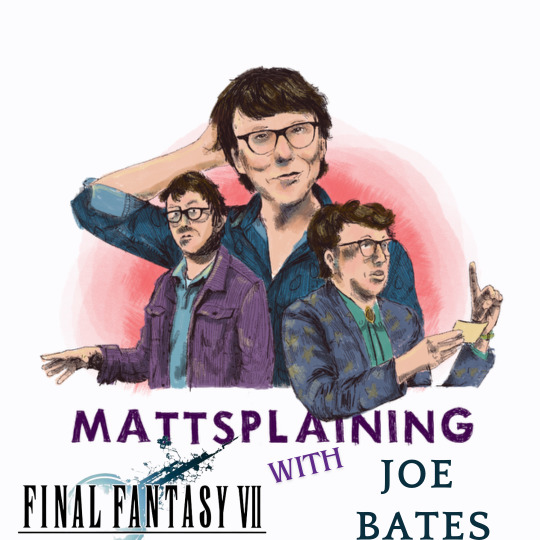
0 notes
Text


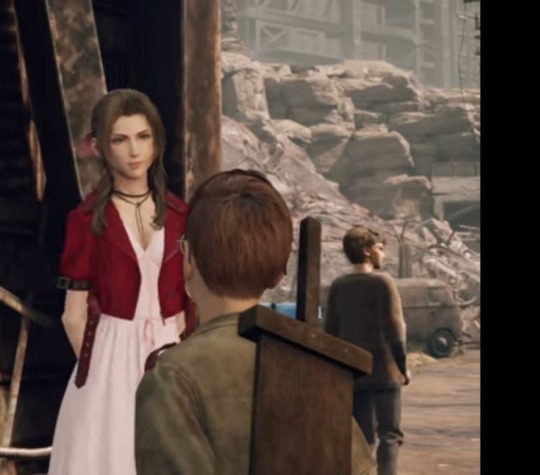
So, yall know about the sector 5 kids with their cute wooden buster swords right?
Bet nobody thought why they have buster swords when it's Cloud's first visit to the sector.
Zack reference. Also, the kid with the sunglasses says SOLDIERs, plural. He met Zack.
This whole chapter is one long love letter between Zack and Aerith, which culminates in her lamenting her lost love during the slide cut scene while Hollow plays.
#Zerith#final fantasy 7 remake spoilers#final fantasy 7 remake analysis#Zack fair#aerith gainsborough#Zack/Aerith#Ff7r#Ffviir#Yall welcome#Hollow is for Zack and Aerith
446 notes
·
View notes
Text
TIFA AND THE MOON SYMBOL – WALL MARKET [symbolism analysis]
Why did Tifa wear the moon earring with her default dress? Why not stars like Aerith’s best dress?
Probably most of us fans know that Cloud and Tifa's promise is represented by the stars. Thus, we often associate Tifa with the stars. This time in FF7R at Wall Market, Tifa wears Moon and Aerith wears Stars. Thinking about it again, Tifa is only represented by the stars concerning her relationship with Cloud. By herself, probably not! So let’s find out how the moon connects with her character:
1. Supreme Beauty Symbol
The other day I came across the Crescent Moon explanation in the Dictionary of Symbol (Jean Chevalier & Alain Gheerbrant, Penguine). The moon is mentioned as “goddess of the night, glory of the stars”. Notice when Tifa wears her default dress, she barely has any makeup. Her hair in untied. Her dress is minimal showing most of her curves and body in general. That’s the true beauty of her features. It’s reconfirmed by how the game focus on Tifa’s beauty in the dialogues.

Next, look at how the game zooms in at the 2 girls accessories because they want us to notice them.

The stars brighten the night. “The best-remembered property of the star is its luminosity and the fact that it is a source of light.” However in our eyes, comparing the stars and the moon:
• The moon is bigger and brighter than the stars
• The moon is unique, stars are abundant
• The stars compliment the moon (Notice in Sailor Moon, the moon is the princess and the stars are like her guardians, too?). Actually, the dictionary also mentioned the moon as “glory of the stars”!
Aerith's best dress is heavier and more complicated so it covers more of her body like legs, thighs, and hip. Like her multilayered dress, her hair is also heavily done in curls and adorned with lots of flowers. She wears the most make-up with her best dress, too. Notice that her dress is red (warm tone) contrasting Tifa’s purple (cold tone). So, I think the game really tries to contrast her to Tifa and by that narratively portraying Tifa's standout beauty and sex appeal. It doesn’t mean Aerith is not beautiful, but Tifa is the real queen of the night.
By the way, I think the Stars of Aerith could fit in the theme of celebrity. Her potrayal with the best dress is like a super star!

2. Lover Symbol
The moon also symbolizes feminine quality and the women while the Sun symbolizes masculinity and the men. In Chinese culture, the moon also represents Yin relative to the Sun’s Yang. Tifa’s dress is in cold color tone is also Yin (warm colors, Yang), which is why I think she doesn’t wear her normal signature red color here. Her depiction here is the moon against Cloud - the Sun. She is Yin while he is Yang. They are one pair.

3. True Love Symbol
The moon also indirectly represents romantic love in literature/art. Its changing phases symbolize passages of time. That quality used to emphasize on how true loves remains the same through changes of time. On this one, the devs have gone above and beyond to spell it out to us with the Cresent Moon Charm’s decsription. But even if they didn’t, naturally the moon still represents the loyalty of lovers to each other. The moon charm fits Tifa well because she is a very loyal and dedicated lover. Her love for Cloud is symbolized and witnessed by the moon. I think the devs really thought carefully about everything they planned on this game :) Stan the devs!
If you have enjoyed this, please check out my other analyses for FF7R:
WHAT DID CLOUD CALL BEAUTIFUL? [cinematic analysis]
FF7 LTD: CLOUD’S TRUTH REVEALED - Chapter 10 [scenario analysis]

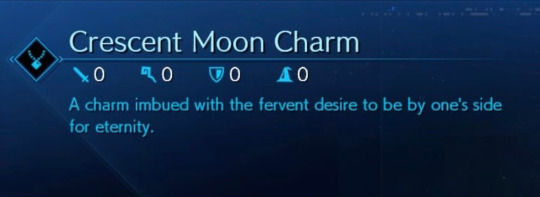
#cloti#クラティ#tifa#tifa lockhart#aerith#aerith gainsborough#cloud strife#cloud x tifa#ff7r#ff7#ffviir#ff7remake#ff7 remake#final fantasy 7 remake#final fantasy vii#ff7r thoughts#final fantasy 7#ff7r analysis#final fantasy 7 remake analysis#FFVII#wall market#tifa tuesday
261 notes
·
View notes
Text
Tifa is the most important person to cloud
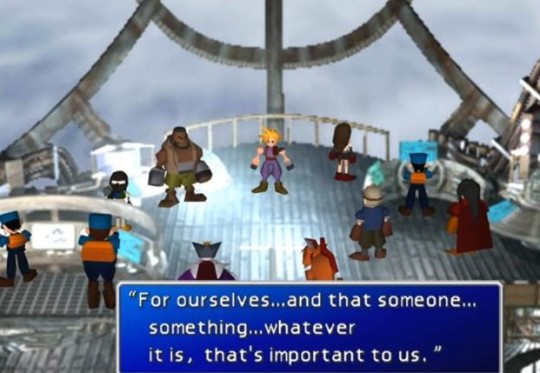

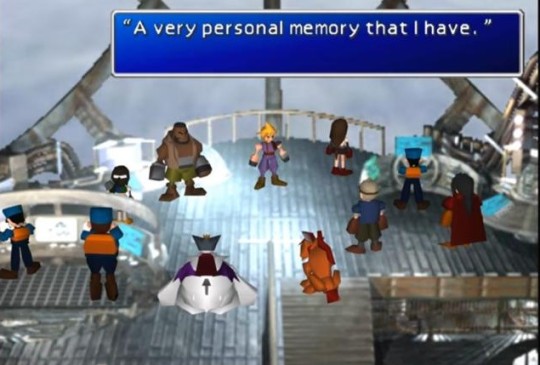
clouds speech about how the party should approach defeating sephiroth
notice the words *very personal*
the game shows us how it’s tifa
barret mentions his important reason being marlene and so he goes and spends the last night with her
cloud doesn’t specify who, only mentions that he does have an important reason, and goes on to spend the last night with tifa...
and its funny to think that there are 2 variants of this night but both of them he spends with tifa. you would think a game where the romance is ‘optional’ they’d give the second outcome to the other girl in the love triangle
he surely could have gone to the forgotten capital or anywhere he associates with aerith but instead he mentions how there is no place for him to go (other than wherever tifa is)

memories
and since cloud doesn’t specify what personal memory it is... lets break it down
1- aerith
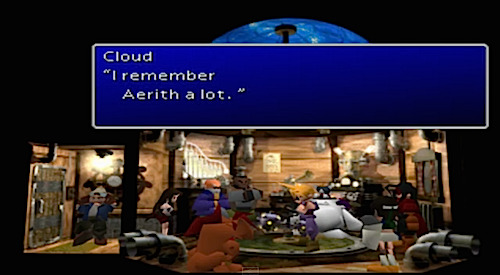
it’s pretty sweet but he mentions in front of the entire party. not how cloud described as ‘very personal’
actually not even a little personal because soon after, everyone joins in saying how they too remember aerith
why does her memory suddenly become personal in his speech, when he had no issue bringing it up to the same people before?
2- tifa
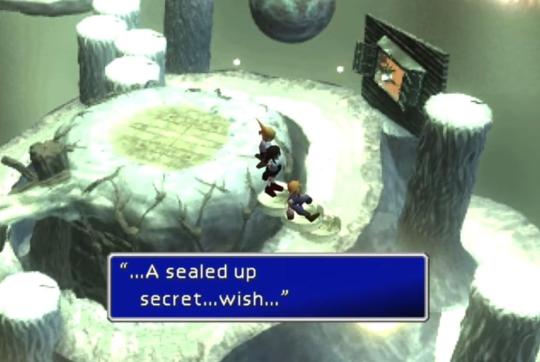

1 - a memory shared between *only* the two of them
2 - its indicated how personal it is within the text it self “no one can ever know” matches up with “ a very personal memory that i have”
and so cloud goes on to defeat sephiroth for tifa for the second time, the first had been in nibleheim
92 notes
·
View notes
Text
The implications of Tifa’s familiarity with Marco
In OG, our first encounter with a clone is in Sector 5, when we’re running around with Aerith. (Link here at 0:14--it’s where we get the infamous “this guy are sick” line!) It’s unclear if OG Tifa has ever met or seen a clone, and even at Nibelheim she doesn’t comment on a single one. (Though to be honest... she doesn’t say a lot in Nibelheim anyway.)
So Remake’s introduction of Marco was a bit of a departure from OG.
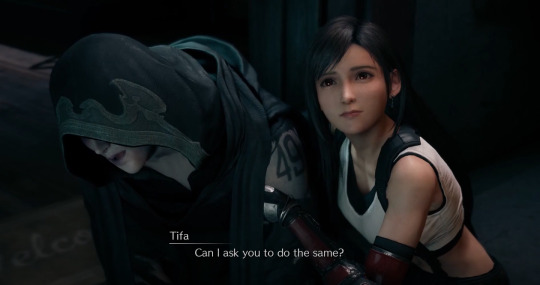
Remake essentially took the 30-second scene from OG Sector 5 and split it up across Chapters 3 and 8, and the encounters themselves were significantly expanded and dramatized to build a “clone arc” with a beginning, middle, and climactic pay-off at Shinra Tower. While I’m 100% confident that these changes were made to adapt the clone storyline to a full-length, Midgar-only game, the implications of Tifa’s new involvement are fascinating and may have an impact beyond Part 1.
Unlike the ambiguity of OG, Remake gives us definitive proof that (1) Tifa is not ignorant to the signs of “clone behavior”--we see her care for Marco when he is deep in the throes of incoherence and delirium. We’re also told that she checks in on him now and then to make sure he’s okay--so (2) Tifa is familiar with the incurability and tragedy of this condition.
In OG, we are shown that Tifa will see these same symptoms of incoherence in someone else:
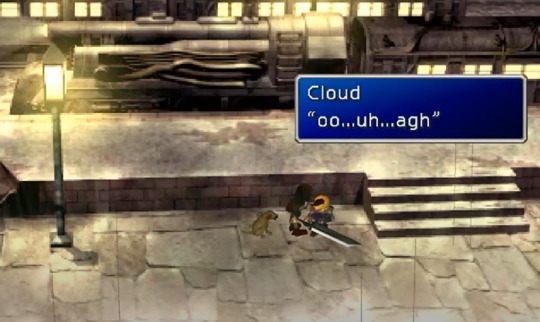
However, unlike Marco’s tragic condition, Cloud’s mysteriously cures itself:

Until she asks him a simple question about the past and it causes him to freak the f out. He terrifyingly, dangerously, uncontrollably flails his sword around while she can only cover her mouth in fear (pay close attention to her hands and body language in the next image--she sees his odd behavior and reacts to it):
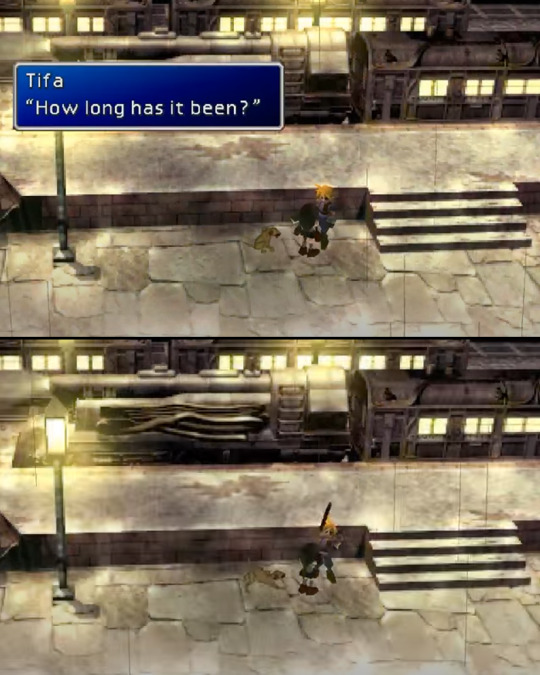
He finally stabilizes in a peaceful, coherent-but-confused state:
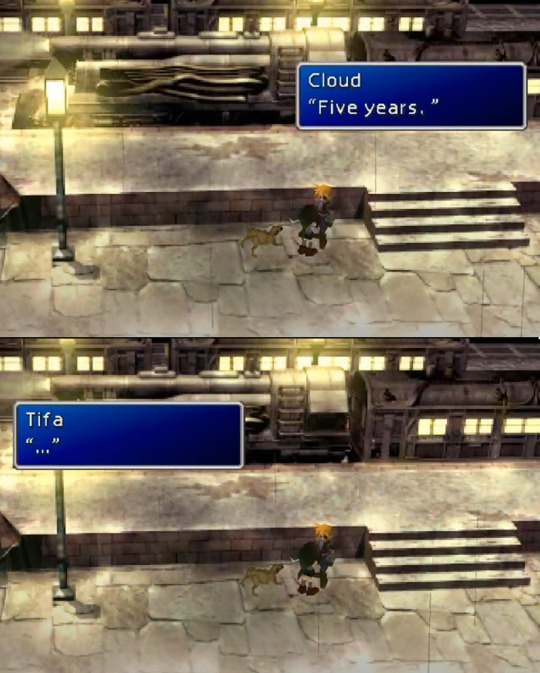
And Tifa is reluctant to broach the topic further, lest he destabilize once more.
(Entire scene here.)
While the body language in the flashback scene is easy to miss, Tifa’s fear and confusion are undeniable. Her motivations for staying silent on Cloud’s disconcerting contradictions are obvious: not only does she not want to chase him off before she can figure out how to cure him, but the one time she did ask him something, his response was uncontrollable and inadvertently dangerous. This scene illustrates the high stakes Tifa thought she'd be playing with if she broached the past with Cloud again.
In Remake, Tifa’s familiarity with Marco can lend her additional insight during this pivotal moment with Cloud, and increase the stakes even further. When she sees an incoherent Cloud at the train station, (1) Tifa recognizes this as “clone behavior” and (2) likely worries that Cloud has the same tragic, incurable affliction as Marco. So when Cloud magically fixes himself, it must feel like a miracle to her. Of course she would likely want to do anything to keep him that way. So if Cloud seemingly regresses--violently or otherwise--when prompted about their past together, Tifa probably doesn’t want to push her luck. After all, what if this is the time he becomes permanently Marco-fied?
The devs are well aware of common anti-Tifa talking points, and used both Remake and Trace of Two Pasts to systematically debunk dozens of them. It seems highly likely that Remake intends to use Marco to refute yet another talking point: “why didn’t Tifa ‘tell the truth?’”
---
(shoutout to @terra-fatalis who encouraged me to get back on my ffvii shit and has an amazing tumblr of their own!)
#ffvii#final fantasy vii#ff7#final fantasy vii remake#cloti#tifa lockhart#cloud strife#cloud x tifa#ffviir#ff7r#final fantasy 7#og spoilers#meta#analysis
143 notes
·
View notes